#Which we will defend with violence because any violence in the name of an oppressed people is justified and our legitimacy comes from the
Explore tagged Tumblr posts
Text
you’re thinking about how easily massive numbers of the wildly antisemitic tankies would have been pulled into the actual political tenets of (esp early to mid 20th century) armed Zionism and you’re laughing?????
#This folks is why analysis of ideology and the structures of an ideology is important#Rather than just random ass ethnic signposting#A lot of people see Zionism as something suspicious and jewy that had to do with Jews - I don’t like them#But the reality of Zionism as an initially distinctly leftist branch of political ideology that sought to liberate an oppressed people#With that tiny niggly wiggly issue of the fact people might#Already have lived on that land???? Ohhhh boy#All these cottage core back to the land the world would be better if I could reject modernity and return to the ancient ways of Farming#Society is broken it cannot be fixed the only option is to found a New Tough society that will fix all our previous problems#And we’ll get round to it in heavily armed leftist commune farming settlements#Which we will defend with violence because any violence in the name of an oppressed people is justified and our legitimacy comes from the#Rifle!!!#The only reason you see this ideology as inherently removed and bizarre is antisemitism and the only reason you see yourself removed from i#Also antisemitism!!!#You would have done numbers in ahdut ha-avoda you would have called Ben gurion abbaleh/#Remember: a bunch of the people who got sucked into this of ideology weren’t the *rich Republican aipac Jews*!*’ your head#They were broke often very secular Jewish leftists working dead end gig economy jobs in farms and sweatshops for whom the idea of a Brave#New World with a. Brave new culture was very appealing and liberating#It offered something new to the broken.#It’s important to talk about this stuff to talk about how it can be undone#But also. The world is not divided into the Oppressed and the Unoppressed#Your political ideology does not stop you from hurting others#No political ideology even anti capitalism or leftism is innately pure- all can harm others#No ethnic and cultural identity no matter how oppressed is free from the potential to subjugate others#No identity or ideology is greater than the right of other people to live freely#Cycles of oppression and the pyramid structure of many empires result in oppressed people harming other oppressed people#Many many goyim think that they’re removed from the logic of Zionism because they aren’t Jews because it’s something wierd and jewy#But I see a lot of the most destructive logics parroted by leftists every day
23 notes
·
View notes
Text
ATSV Fun Fact!! - Mumbattan Cultural Details
Gayatri & Inspector Singh follow the Sikh Religion
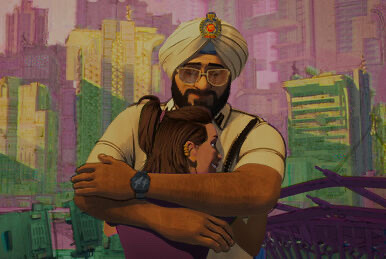
Have you ever heard of Punjabi Sikhs?
If you don't know - Sikhism is a religion that originates in northern India, specifically Punjab.
The turban Gayatri's father wears - along with his last name 'Singh' implies that her father is most likely a Punjabi Sikh.
I notice this the first time watching ATSV and was like 'wow that's so cool :)'
It only hit me today that 'Oh wait I don't think a lot of people know about this very-specific, rarely-mentioned religion maybe i should say something,'
And because I LOVE yelling about world culture, LET'S GO!!!
[a SHORT essay where I explain the basics of Sikhism, a religion built on equality and justice. And details in The Singhs design, and exactly why Sikh Representation matters]
So What's Sikhism about?
Often mistaken for Muslims - Sikhs are actually a non-Abrahamic religion, with 20 million followers worldwide.
But even with so many visible practicing members, most people know very very little about this beautiful religion!
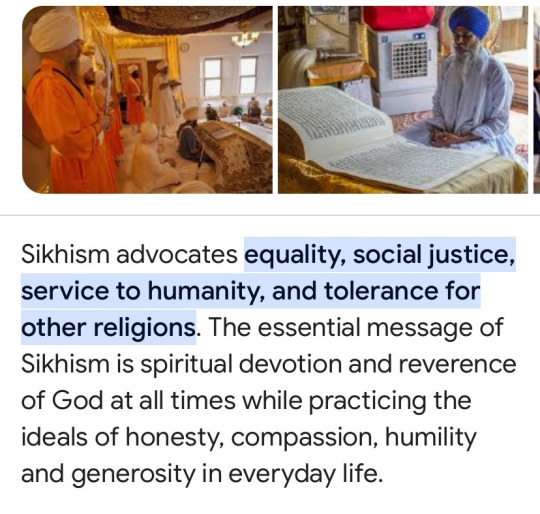
Sikhs believe in equality and unity - and defending the oppressed. Their book of faith, The Guru Granth Sahib Ji, is called 'Guru' for a reason - Sikhs see the book as not just a code of conduct, but as a living, breathing teacher for every practicioner;
From Wikipedia on Guru Granth Sahib: Sikhs since then [1708] have accepted the Guru Granth Sahib, the sacred scripture, as their eternal-living guru, as the embodiment of the ten Sikh Gurus, the highest religious and spiritual guide for Sikhs. It plays a central role in guiding the Sikh's way of life.
The Guru Granth Sahib is the spiritual leader of Sikhism, and it's treated as such.

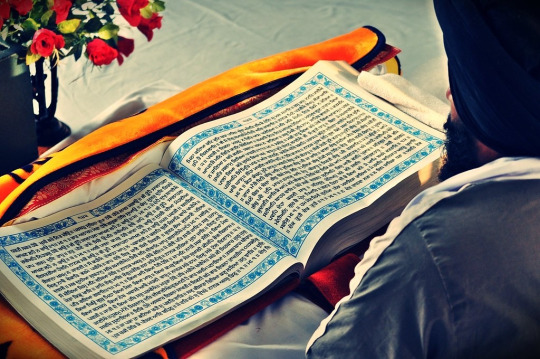

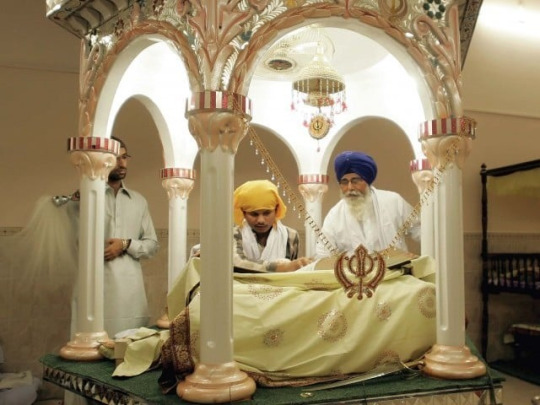
That's why in Gurdwaras - their place of worship - it's treated as such, being clothed and held in ornate structure, constantly fanned throughout it's readings (the fan you can see in the left picture).
They believe that by following the Guru Granth Sahib Ji, they can cultivate compassion, peace, and harmony in their communities, while diminishing 'Mara' - concepts like hatred or violence.
Sikhs believe that every Sikh should revere themselves as champions of unity. And because of this many Sikhs have the same last name -
Kaur for women (Meaning Princess) and Singh for men (Meaning Lion).
Having the same last name also does away with the Indian caste system, making it another point of equality.
In ATSV Gayatri last name is Singh. However from my understanding, her name would most likely be Gayatri Kaur in reality.
I think they kept her last name as Singh as a deliberate choice to keep her initials as GS, like Gwen Stacy.
So is Gayatri Sikh?
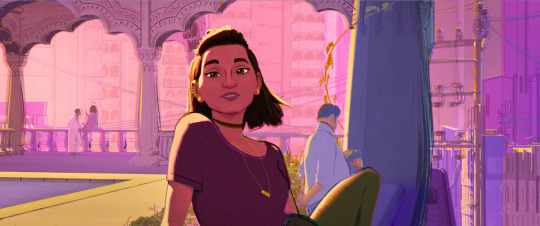
Maybe - most likely.
But we can't be sure. Mainly because of her hair.
Gayatri has a short bob haircut, and while that might not seem like it matters, it does!
In Sikhism there are the '5K's - different aspects Sikhs wear to show their faith.
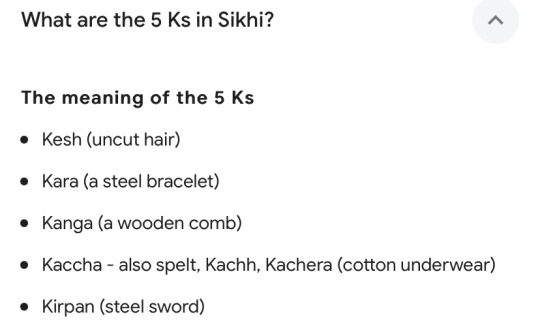
Notice the first one?
'Kesh' is the practice of leaving ones hair completely uncut. That's why you may see a lot of Sikh men with long, long beards!
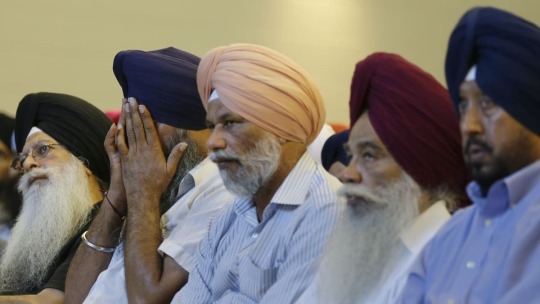
And hence, the large turbans.
It's done as respect for God's creation - leaving it unaltered.
[Fun Fact! - Rastafarians, a Jamaican religion, also don't cut their hair for this reason. Think Bob Marley. Rastas call God - Jah]
So, Gayatri having short hair means she doesn't keep Kesh.
However, Sikh is a super accepting and open religion, and it's main focus is on acceptance of difference, not conformity - so she could entirely follow the faith without doing all of any of the 5Ks.
Also, if you're curious about the steel sword K - Kirpan, yes that's a thing!
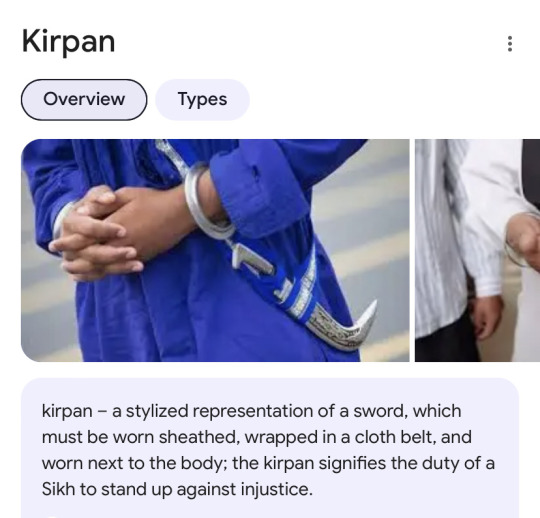
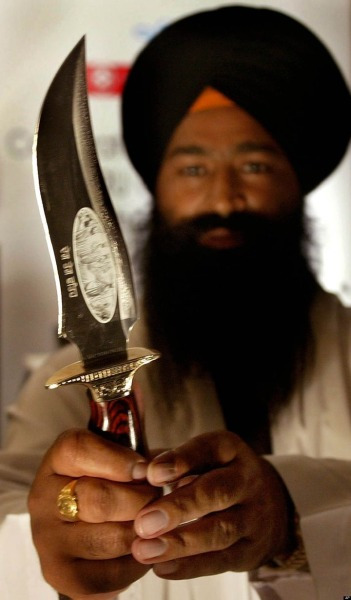
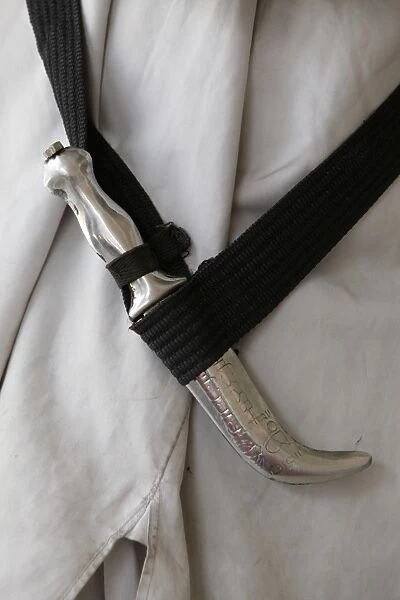
Sikhs of all genders are encouraged to carry a small ceremonial blade with them.
Instead it's a symbol of the commitment to fighting for what's right - and defending those who cannot defend themselves.
A Kirpan can ONLY be used to defend the life of yourself or others, which is incredibly rare.
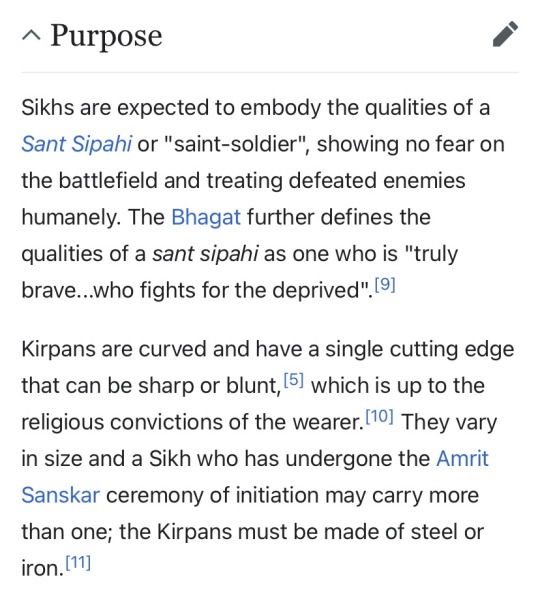

Why is this all so rad, cool, and important?
If you haven't noticed by now, Sikhism is a religion driven by justice. Not just in theory, but in really life as well.
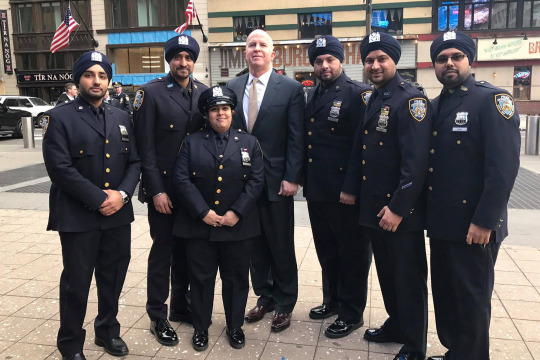
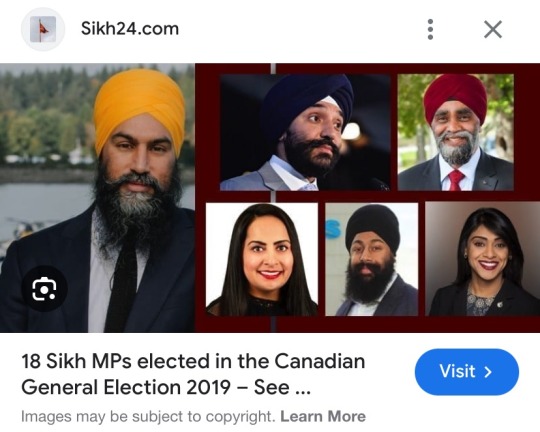
That's why you may see many Sikh police officers and politicians, even here in the West. Most of them wearing the emblem on their turbans.
In fact, Canada has SO MANY Sikh politicians, that in 2019 they elected 18 of them.
For centuries Sikhs have been dedicated to justice, and developing systems of support, whether that be political involvement or feeding those in need.
The biggest Gurdwara (a place of Sikh worship) The Golden Temple feeds over 100,000 people A DAY.
For FREE.
It's a practice called Langar. A communal meal anyone can enjoy. And of course, Langar food is vegetarian.
Making Inspector Singh a Sikh - and showing him saving people and being warm to his daughter on screen is great representation for a community so often overlooked! Despite the fact they are over 20 million practicing Sikhs.
It's a great detail for Indian and Punjabi representation in specific. It accurate shows their beliefs and commitment towards helping others, no matter the cost.
And from what we can tell, this choice came later in development. We know this because ALL of his concept art shows him with a turban, not keeping Kesh.
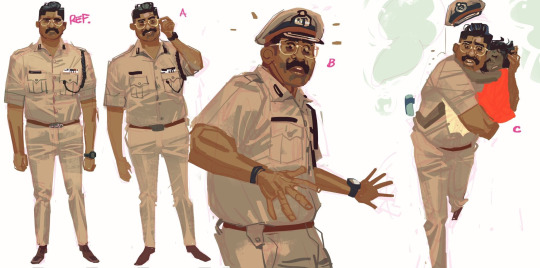
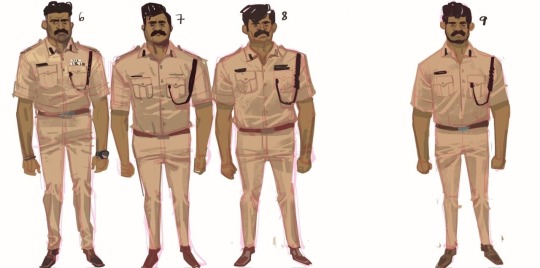
It seems like someone later on down the line said 'Wait if his name is Singh I think he's Sikh and if he's Sikh then we're gonna have to redesign him and make that obvious oops'.
That, dear audience, is why you always have an Anthropologist in the writing room. Or some amateur anthropologist like me :)
-------------
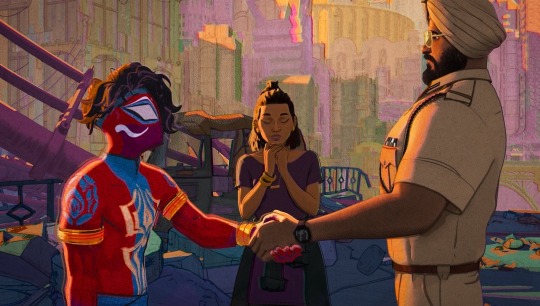
I hope you enjoyed reading this, I really enjoyed writing it!! Sikhism is one of my favorite religions and if you have never heard anything from the Guru Granth Sahib I HIGHLY recommend it, it's very optimistic and compassionate. Sikhnet(.)com is also a great resource!
I have no idea if this will pique anyone's interest, but I hardly ever see Sikhs reflected in media and I know many many people may confuse them with Muslim, especially since many women Sikhs keep kesh and cover their hair as well.
But if you ever wanted to know the difference, here it is! If you read this far, thank you SO MUCH. And if you're a Sikh and reading this, I LOVE YOU SO MUCH.
As usual, here's a photo of Hobie for your travels.
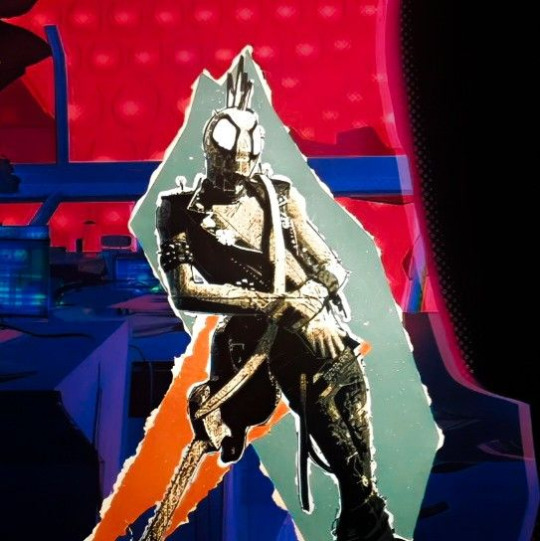
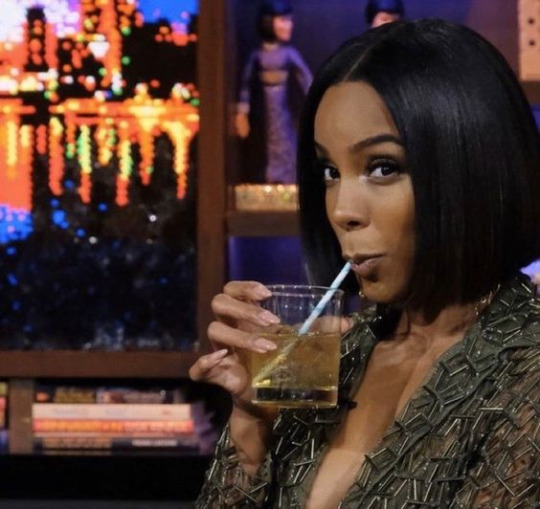
BYE.
#Did yall know about this? Idk know is any of this is common knowledge im gonna be real dugshjdgjks#It's a GREAT detail its so small but I love it#no proofread you get what i meant#and of course if you have any info to add or correct me on#feel free!! I wanna spread accurate info :)#spiderman#atsv#spider man#marvel#across the spiderverse#pavitr prabhakar#atsv meta#atsv meta analysis#meta#meta analysis#spiderman india#spider man india#pavitr#atsv pavitr#gayatri singh
508 notes
·
View notes
Text
The Demonizing of Change
A trend I've noticed in modern media is that many stories have the message of "protect the status quo". Whether it's a Marvel movie or a fantasy book, the fact that so often the villains are the only ones who fight to change society remains the same.
We all know the story: they were hurt by the system's flaw(s) and so they rose up to destroy that harmful system and in the process destroyed themselves. I'm not saying that this character type is wrong or bad (definitely overused imo), but the framing of the narrative and the protagonists is the issue.
The narrative typically shows the villain's first wrong doing to be the act of rebelling against the system. From the moment the person chose to reject the harmful system, they were in the wrong, or so the narrative frames it. Meanwhile, the protagonist may question and see injustice but they never fight it; it's just accepted and blindly defended. What's worse is the audience chooses to completely accept this telling and sides with the harmful regime the protagonist defends.
I find that some of the most drastic examples of these issues are Daenerys in GOT and the Darkling in the Grishaverse/SaB.
Daenerys Targaryen
One thing I want to specify before I go into this is that Dany's GOT ending is purely bad writing. It's not foreshadowed or justified in any way, so I'll be addressing how D&D tried to frame her past after S8e6 aired and how her antis interpret her.
According to D&D, we should see the beginning of Dany's "madness arc" from the very first season. Namely how she reacted to Viserys' death. While this isn't Dany rejecting a harmful system, her choosing to not defend Viserys (why would she??) is also her choosing to leave behind the cycle of abuse of her early life. It also sets the precedent of Dany killing/allowing the deaths of evil men.
Speaking of evil men, D&D also tried to paint Dany's campaign against slavery as a sign of her "megalomania and madness". This is where we get to the actual fighting against the system. Dany is leading a slave revolt and forcefully overthrowing the masters and the oppressive governments.
The way D&D tried to spin it was that Dany was wrong for using violence, and Tyrion's peaceful method was more successful. Except Dany did try peace in Meereen, it didn't work. She made concessions, she made agreements, she locked up her dragons and they weren't working. That's the whole point of her last chapter in ADWD.
However, the show chose to make it so Dany was failing because she was "too violent" and ultimately made the freedmen hate her. This choice, a clear deviation from the book, is the beginning of them trying to make Dany fall into the trope of "as bad as those you're fighting". In her fight to end slavery, she becomes as oppressive as the masters.
Which is just blatantly wrong. We see in the show that the freedmen are still free, they sit in her councils, they can come to her with their complaints and she listens. Dany is a queen, not a master. The show was already trying to gaslight its audience into believing the opposite of what they wrote. The same goes for her supposed violence. The violence she exerts is almost always towards the slavers, except when she executed Mossador for murder. That was her carrying out justice, why that was portrayed as a bad thing is beyond me.
The implications of the choices D&D made in adapting Dany's Meereen arc are very disturbing. They're basically saying that systematic and centuries old oppression should never be addressed with violence. The people who actively fight oppression are just as bad as the oppressors. If you can't magically fix a system that's been flawed for centuries immediately, you're a tyrant.
The choice to resolve the arc by having Tyrion come in with some great peaceful solution was plain stupid and sexist. We have seen in history that trying to unobtrusively phase out slavery doesn't work. By leaving the elite slave owners in peace, they are allowed to simply find ways to get around or wear down the changes. We see that in ADWD in Meereen by the way. Also the whole idea that a wise man had to come and fix the irrational woman's problem is so gross.
So basically: D&D took an arc about fighting oppression and learning that concessions only continue the cycle of violence and made it into a story about how violence is bad and you can actually just reason with slavers.
The disgusting ideas continue in season eight, where Dany torches KL for no reason and is put down like a rabid dog. Dany is the only character who wants to end oppression in this show. She's the only person to see and experience the suffering of the oppressed and chooses to do something about it. Season seven is full of her talking about leaving the world a better place and breaking the wheel. But in season eight "breaking the wheel" is turned into th deranged battle cry of her desired empire.
Let me restate that: the one character who fought to end systematic oppression is turned into the "true oppressor". Dany's desire to tear down the system that the entire show established as being unjust and awful is made into a sign of madness. Even in season seven, people were rolling their eyes at her talking about breaking the wheel.
Meanwhile, the protagonists of the show end it benefitting from the same system that tortured them the whole time. Westerosi society is shit, but the show ends glorifying the sexist, homophobic, classist, and feudalist kingdoms. They even laugh at Samwell Tarly when he suggests destroying the monarchy. All this sends the message that embracing the system is good, rebellion bad, and shut the fuck up if you're not happy.
Dany was reduced to a cautionary tale against fighting the system. I've seen people frame it as "seeking power is bad", but that doesn't make sense, as characters like Sansa actively seek power and are rewarded by the narrative. Dany's mistake was trying to change the world, rather than supporting it as it is.
The Darkling
The Darkling is a very different character from Dany; he's an actual villain. Aleksander is someone who has already reached the "become what you hate most" part of the trope, so he spends the whole story committing atrocities. The issue with his portrayal is the fact that the narrative and protagonists never address his very real reasons for fighting in the first place.
The grisha as a group are persecuted all throughout Ravka, they have been for centuries. The whole reason Aleksander begins his fight was to protect his people. By the time the series begins, the grisha are more protected, though only because they have become weapons of the state. That was only through Aleksander's mechanisations.
Aleksander became a villain in his attempts to save his people, making him a tragic character. So he has perfectly fallen into the trope, and, unfortunately, so do the protagonists. Alina and her allies all have seen and suffered under the cruelty of the Ravkan monarchy, however, they quickly dismiss just how awful it is. By the end of the story, the Darkling has become, in their eyes, the sole perpetrator of evil in Ravka.
There are no attempts made to rectify the constant damage done by the Apparat, in fact he's left to run free. Alexander Lanstov and Tatiana Grimjer are simply shipped off to a private island where they never are made to pay for the awful things they have done. There are no political reforms done to ensure the safety of grisha in the future; they're basically relying on the goodwill Zoya and Alina have bought with the people.
So basically, the minor villains who all had no reason to be completely atrocious receive basically no punishment from the narrative. Meanwhile, Aleksander, who had very valid reasons for wanting to overthrow the government, is ultimately given a fate worse than death. All his reasons for hating the Ravkan government and the power it has are ignored, even though the story set up that he's not wrong. The resolution of the story leaves the grisha just as, if not more, vulnerable to the prejudice and hatred of the world than they were before.
The narrative is communicating that Aleksander rising up for his people is worse than the centuries of corrupt Lanstovs. Aleksander is worse than the man who stirs up religious fanaticism and exploits the people through it. Yes, Aleksander did horrible things, but so did every other antagonist in the series, but he's somehow the worst because...well, he's grisha.
That's the only other difference between him and the others, aside from his motives. So either Bardugo is supporting the in-universe prejudice against grisha or she's saying rising up against an oppressive system is wrong. I don't expect her or any other author to have complex political and social commentaries in her story. However, she chose to create a world containing those elements and a main character who suffers from them. She chose to make the issues with the system have a prominent place in the story. And she chose to ignore them in the end.
Aleksander did awful things in the name of a just cause, this creates a complex moral issue that the story just never addresses. The established injustices and sanctioned atrocities by the Lanstovs are all ignored in favor of bringing down the dangerous rebel. That kind of message is pretty fucked up. Yes, Nikolai is a better man than his father, but what about his descendants? The propaganda of the Apparat and his church are extremely strong, it's only a matter of time before that propaganda once again starts turning people against grisha. The hatred of grisha is still embedded into Ravkan society.
Aleksander was the only character who was actually set on protecting and bettering the lives of the grisha. His original mission was still extremely important, no matter what he devolved to. The fact that the protagonists just blatantly dismissed just how dangerous Ravka still is for grisha is frustrating.
The treatment of both Dany and Aleksander by their writers and narratives show a hatred/mistrust of rebellion against the status quo, no matter how atrocious it is. The message of the trope is that people who fight against a system are worse than the system itself. I'm not saying that was Bardugo's intention (D&D I'm much less sure about though), but the way both the Darkling and Dany were written combined with the endings of the stories support that idea.
#daenerys targaryen#aleksander morozova#the darkling#pro daenerys#pro darkling#anti d&d#anti got#anti leigh bardugo#asoiaf#grishaverse#the grisha trilogy
129 notes
·
View notes
Text
Mobile Suit Gundam - The Witch From Mercury S2 Episode 8: The End of Hope
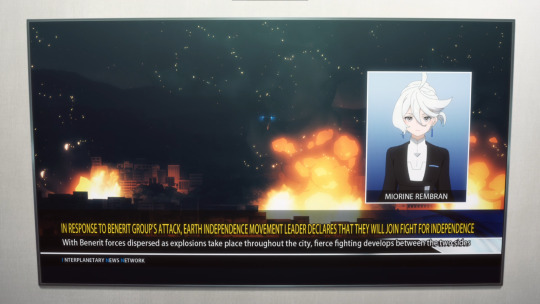
So, last episode was violence on earth, and this episode is violence in space! What do we call that? A cycle! That's right. Good old Gundam, perpetuating violence through one sided fixations on the other's wrongdoings, which is perfectly personified through Shaddiq in this episode. Lots of stuff to talk about for sure!
This episode is interesting in that sense, it's less methodic and progress focused than the previous, almost catching you off guard as you shift from the norm towards combat. Regardless of that though, Shaddiq is a total piece of work through it all. It's pretty incredible.
The Earthian boy that allowed space to get to his head. Shaddiq was an orphan from Earth who worked his way up through Grassley to get a spot at Astacassia, and is now using it "to his advantage" to bring equality and power back to the hands of Earthians. What he doesn't, and will probably never realize, is that he's only serving to exacerbate it by perpetuating exactly what his adoptive forefathers did. In a terrible twist of fate, all Shaddiq is able to do is dirty the lives of others. He forces Guel to kill his own father to survive, he forces Miorine to dirty her hands because she doesn't want to be owned by Shaddiq, and he ruins the lives of such an innumerable amount of people that you can't begin to quantify it. All because he wants to bring peace and equality to Earth. But he can never understand his actions. He could never understand what it's like to kill your own father, what it's like to watch on as violence is incurred in your name. And this episode illustrates that incredible well, that Shaddiq is a Spacian, more than any of these other characters he despises, as his words completely betray him.
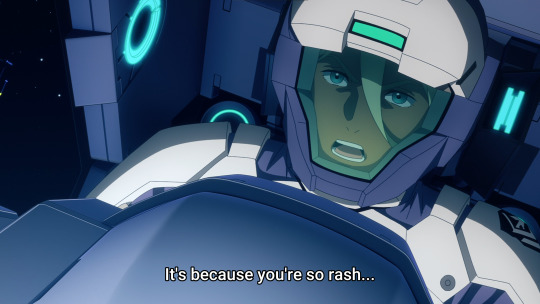
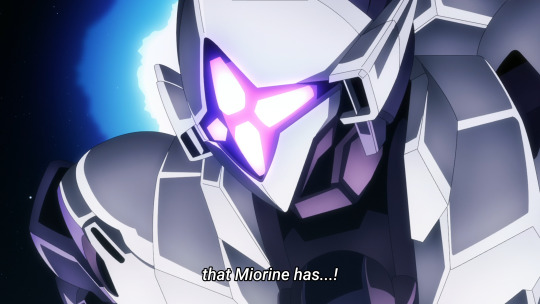
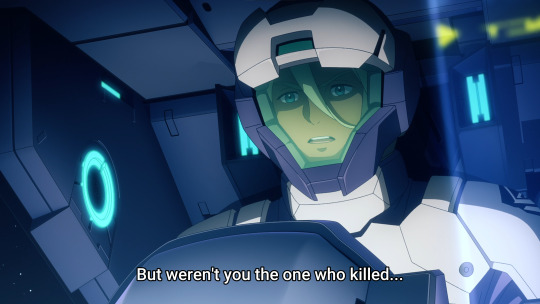
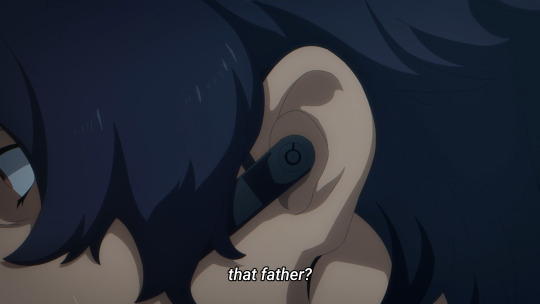
His entire existence is centered around his ability to bring their own lives back into the hands of Earthians, but he entirely misses the point. All he does is take advantage of. He takes, and takes, and takes some more, and offers nothing but hellfire and brimstone to the people that he wants to help. He brings oppression, violence, sanctions, all manner of terrible fates to the people he cares about, because the scope of his desire is so narrow. He wants to erase the past that he existed in, rather than focus on the future moving forward. In that sense, he plays a very solid second fiddle to Prospera (and raises up Guel even more, which I'll touch on later), as their foolish grasp on history blinds them to the atrocities that they commit in their names.
Just a quick little interlude here as the grounds of Astacassia are under attack during Guel and Shaddiq's fight. I thought this was a really great piece to appear in it. Miorine's tomato greenhouse was destroyed. Not by gundvolvas or even Norea herself, but someone defending Astacassia from her. What a sad, sad fate. A peaceful existence, quashed not by the enemy, but the people she might even call allies. Such a throwaway piece, but one that speaks to the boundless and senseless act of violence. To how inescapable it can be, to both sides of the conflict.
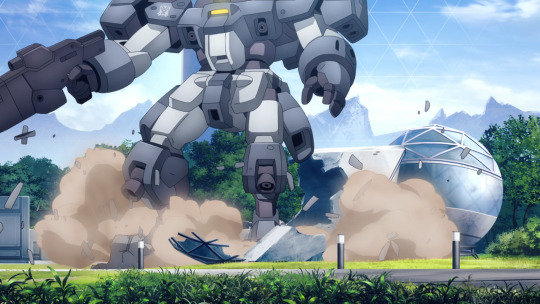
Anyways, back to Guel and his hubris. The sheer mockery that is his existence is palpable. "If you didn't get expelled from the school, if you didn't try to make things right and help out Plant Quetta during a terrorist attack, if you didn't try to thwart my plans, your father would still be alive, if you didn't fight to be a better person, my Miorine would still be clean.". Shaddiq embodies more selfishness than Guel could ever manage to muster in his existence. Even as the self-centered Holder of Astacassia, he could never stoop to the depths that Shaddiq inhabits.

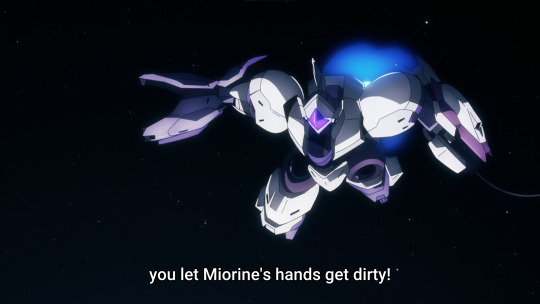
And that's illustrated perfectly here. Shaddiq blames everybody around him for everything that has happened to him. Despite being the leading son of the Grassley House. Despite having the tools to change the world at his fingertips if he so wanted. He believes he needs to deliver power to the Earthians, through terror and violence that incurs the wrath of Spacians. Despite the peaceful approach that Gund-ARM desired, despite the wishes and fears of Guel, at each step he has refused to use his power, and relies on that of the group. He relies on their reactions to violence, he relies on the hatred of Spacians by the inhabitants of Earth. He only uses his power to take from those around him, and in turn drags them further into this abyss.
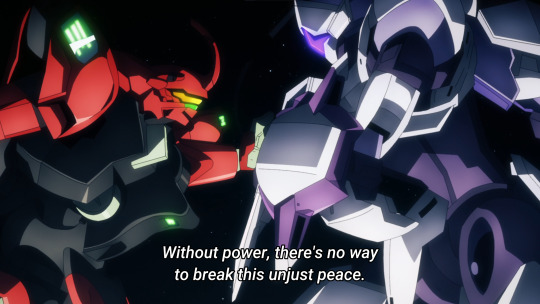
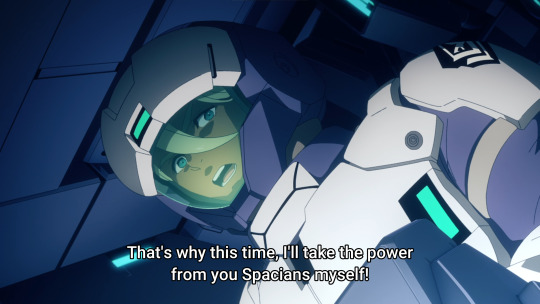
Then there's this moment. This line from Shaddiq. The sheer hubris of it is hilarious. And Guel destroys it right away.
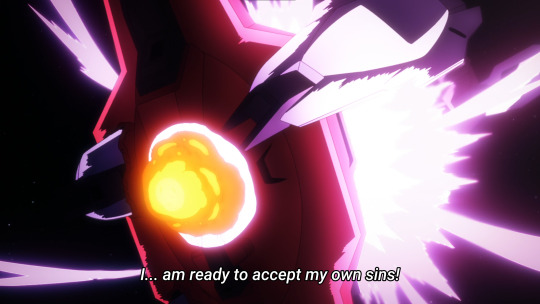
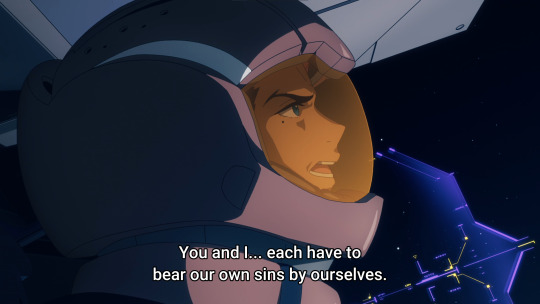
The difference in wording speaks volumes. Shaddiq could only ever acknowledge what he's doing. He can sit and there and say, "I did some bad things for the sake of Earthians", and immediately, he absolves himself of it because of why he did it. Guel, on the other hand, chooses to carry that weight with him for the rest of his life. The inescapable burden of his father's death, of that girl dying in his arms, of his inaction and what it's led to. He refuses to justify his sins in the bigger picture. And that dissonance extends to the girls around Shaddiq, as they speak of "silver spoons" while piloting their top of the line Gundams, as they sortie from the incredibly exclusive and highly expensive Astacassia school ran by Spacians.
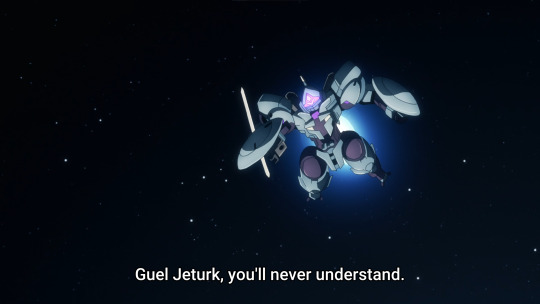
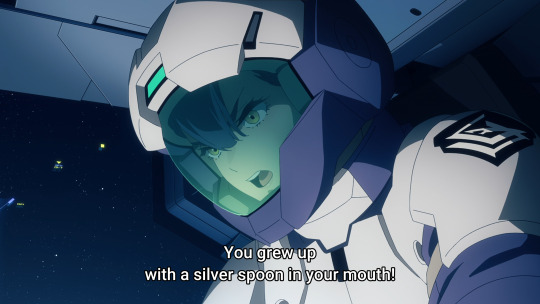
Then there's this last part from Guel is just outstanding. Given the context of Shaddiq and his crew being out for blood, Guel's effort in bringing in the Grassley House unharmed just further widens the ocean's width between the two characters. I especially love it because it speaks to exactly what I was saying so far about Shaddiq, and because it's Guel's version of the words that Suletta gave him.
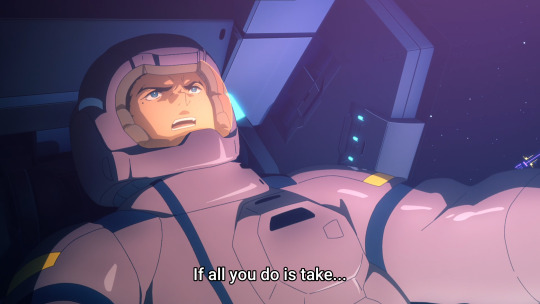

And to finish off the Shaddiq content of this episode, we have Sarius. His forced passivity through this all, in concert with this comment, speak volumes to his feelings of it. He's lived through this before, he's experienced similar issues and challenges, and he knows where this path will lead to. But in the end, he remained powerless and oblivious to the plight of his son. It's rather depressing to see the resignation on his face at his failure in raising Shaddiq.
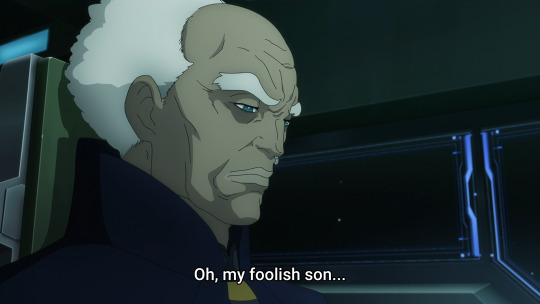
Now then, we can move onto Norea and Elan! What an interesting pair, I do think that Norea's character is a bit overblown than need be for he purpose, but there's still plenty of great moments. I really like how despite her hatred of mobile suits and Gundams, the only thing that she thinks she has left is to pilot them. Through her short life, all she could do at the end of it was fight, she could never find a way to run, to leave behind those feelings of hatred and resentment for the life that she was forced into.
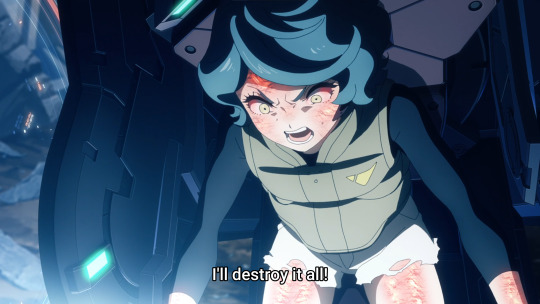
And Elan can't help but intervene. The Elan that would only ever run away, only ever fight to preserve his own life, is drawn to Norea. Forced to pilot for the sake of others, relinquishing their chances at a normal life because of the selfishness of Spacians, the pair find common ground in losing their lives and passions to capitalist money machine that is the Benerit Group. I think it's a really great and emotional moment, to bring the puppet of a clone of Peil Technologies, and the child soldier of the Dawn of Fold together in their desire to flee their lives and discover something outside of their current existences. Sadly, this Elan has his chance, but Norea's fate has already been sealed due to her actions.
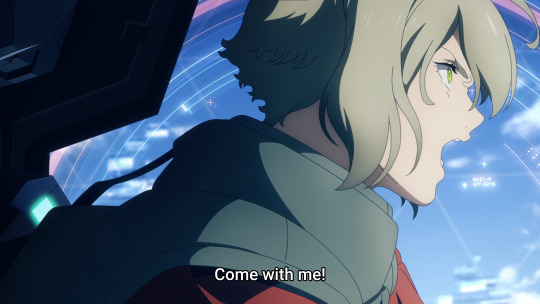
Finally, we arrive at the end of the conflict. A mass of rubble and bodies litter the ground from the conflict as we find Suletta on her own moving earth to try and help the people beneath it. I think it's a really important piece, both in regards to Suletta and the relations between Earthians and Spacians at Astacassia. Though they're meant to be cogs in the cycle of perpetuated violence and control, some of the students at this school have found ways to connect with one another past the boundaries of Earth and Space. Working together to defend Astacassia, or helping save injured students, or removing those trapped from the rubble. It speaks to the passion and desire to good that the Earthians aboard Astacassia have spread and infected those around them with. Alongside Suletta, they've broken the curse of Prospera's words, and in doing so, have helped free Suletta. Without Aerial, without her mother or Miorine or any of the other crutches that brought her this far, she remains in the dark, with bloodied and bruised hands, searching for life amidst the destruction.
It's an astoundingly good GWitch episode, and moves the characters forward in incredible ways. Shaddiq's hubris arrives at his doorstep as Guel find vindication in bringing him to justice, while Norea makes peace with the life that was stolen from her that Elan carries onwards, and Suletta and the Earth house continue their calling of peace and helping others even in spite of the atrocity that was committed in the name of their company.
The cycle of violence leaves nobody untouched, but it doesn't mean you must succumb to it. This episode speaks to that greatly. That you are justified in your hate and resentment for what life has done for you, but that you also hold the tools within your own hands to change that. To rally against it and make a difference, to speak out against those actions and to fight to find ways to break that cycle. Whether it's within the scope of the school you go to, or the whole of humanity.
#the witch from mercury#gundam the witch from mercury#機動戦士ガンダム 水星の魔女#kidou senshi gundam: suisei no majo#gundam witch#gundam witch from mercury#gundam suisei no majo#suisei no majo#g witch#witch from mercury#mobile suit gundam#gundam#suletta mercury#guel jeturk#miorine rembran#shaddiq zenelli#anime recommendation#anime review#anime and manga#anime#anime original#mecha anime
266 notes
·
View notes
Text
i hate that the mainstream’s view of uprisings are only positive when it’s peaceful and nonviolent. if the uprising is violent in any way, it is devalued and codemned.
a good example of this, at least for the understanding of americans, is the reception to martin luther king vs the black panther party.
martin luther king is revered. he has a day dedicated to him. people point to dr king and say “that is what protesting should be.” he is seen as the pinnacle. he is put on a pedestal for his peaceful form of resistance. his method is the blueprint, and any movement that doesn’t do it like him is wrong and bad.
(with that being said: trust me, i am not here to shame dr king or nonviolent protest in any way— i myself am a pacifist and have participated in nonviolent protests, and i know that peaceful protests can be very effective— but the way people (namely zionists in recent times) use dr king’s name to delegitimize other movements is abhorrent. but let’s get back to the main point!)
and then you look at the black panther party.
i was not taught about them in school. all i heard about them was bad. people said they were bad. they weren’t the “good” movement. i didn’t really learn about them until i was older, and even now i am still learning about them. they were armed. they defended themselves. their protests weren’t always peaceful. but they achieved so much. they helped a lot of people. they inspired countless movements all across the world. and yet the publicity i heard about them was nothing but negative.
we see this same thing happening with the israel vs hamas bullshit (and i hate saying “israel vs hamas” because that’s horrid framing. it is really a powerful apartheid state vs oppressed civilians.)
palestinian resistance (and you will hear it be called an intifada, which is simply another name for an uprising) is condemned because of the use of violence. the larger issue of genocide and apartheid (an apartheid regime that directly and intentionally uplifted hamas, mind you) is brushed off because the movement doesn’t present itself as a “respectable” movement.
but they shouldn’t have to be respectable. they have been disrespected for generations. they don’t have to appease anyone. however their uprising is presented, palestine still deserves liberation, autonomy, and reparations. that will not change.
#free palestine#idk if this is anything New but it’s something that’s been trapped in my head for so long
7 notes
·
View notes
Text
By: Christopher F. Rufo
Published: Oct 22, 2024
Since the outbreak of the Israel-Hamas war more than a year ago, perplexing forms of open anti-Semitism have cropped up on both sides of the political aisle. First visible on the political left with an eruption of protests and even of violence on Ivy League campuses, it also appeared soon enough on the political right.
What has transpired is a complex story about the academy and the internet, the elite and the fringes—one that we must confront directly as it reveals something rotten in our politics. This concerning trajectory can only be changed through the restoration of higher principles that once kept these threats in check. In the face of dangerous identity-based ideologies, it is crucial to return to America’s historic defense of colorblindness, meritocracy, and fair play.
Left-wingers have participated in anti-Israel and pro-Hamas agitation, in some cases even defending the Hamas militants who massacred approximately some 1,200 innocents, including at a music festival. Keffiyeh-clad student protesters captured buildings at Columbia, eventually setting off a wave of copycat flashpoints at other universities. Elites institutions like Harvard—which previously had issued statements on political controversies ranging from Black Lives Matter and #MeToo to the war in Ukraine—suddenly went silent on the Israel-Hamas war in the name of protecting freedom of speech.
These institutions have failed to keep in check the simplistic oppressor-versus-oppressed ideology that undergirds the worldview of today’s left. The provincial-minded elites that call the shots in these institutions tend to filter every conflict through this ideological lens, looking primarily to skin color and then power dynamics as the main criteria for judging the rectitude of a cause. Palestinians, with their slightly darker skin tone and less developed economy and military, fit the “oppressed” mold, thus making the Jewish state their “oppressor.”
Though this line of thought dates back to the 1960s (think of the Black Panthers’ alliance with the Palestinian cause), this is the first time that it has come to dominate discourse on university campuses. This is thanks in part to the collapse of intellectual diversity on campus. But it also has attracted numerous students and professors because of the prevalence of victim worship and the subsequent resentment toward successful groups. In their eyes, Palestinians are a kind of eternal victim. A pseudo-historical narrative tells us they have been victimized for time everlasting, and lack any agency in their own fate. Ironically, the oppression of the Jews dates back to biblical times, yet American Jews are one of the most successful groups in academia and other intellectual professions. The success of a minority group throws a wrench into the left’s narrative gears.
Across the political aisle, anti-Semitic ideologies have a history of appearing in the form of conspiratorial thinking on the fringes of American conservatism. Lately, it has been the non-traditional right-wingers—who, because of how our politics works, have been lumped in with “conservatism” writ large—who espouse such views. Take Kanye West, who was a kind of ally to Donald Tru.mp and then embedded himself within the right, eventually suffering from mental breakdowns and going off on anti-Semitic rants.
Or Candace Owens, who, although always controversial, once understood where the lines lay. This was in part because of her employers, her partners, and the rules on platforms like YouTube or X (formerly Twitter). Yet in recent months, she began questioning whether the Axis powers deserved Western antipathy, and even apologizing for Kanye’s threat to “go defcon three on some Jews” and musing about a “small ring of people in Hollywood who are using the fact that they are Jewish to shield” their supposed crimes (always careful to hedge, she insists this characterization doesn’t apply to American Jewry writ large, but the hallmarks of classic anti-Semitism are unmistakable in her discourse).
On X, many right-wing accounts espouse open anti-Semitism, often posting allegedly ironic memes about Adolf Hitler. I once posted something about critical race theory, and was told by one of these accounts, “Well, you know that critical race theory was invented by Jews.” Though this kind of right-wing conspiratorial thinking is nothing new, the fact that it has become so commonplace on online platforms like X is an alarming novelty that merits our concern.
The growing distrust of mainstream institutions that is characteristic of today’s right can’t be written off completely. This sentiment—ushered in by figures like Donald Tru.mp—swept away the broken establishment Republican consensus, yet it has failed to fill the ideological vacuum it has created. Tru.mp tried to fill it with partisan politics but lacked an adequate intellectual framework. Those who retrofitted their ideologies to Tru.mp attempted to create an intellectual substructure for his presidency, in some cases ushering in a kind of chaotic element. To be sure, chaos can create space for creativity. But it always comes with a downside.
This ideological vacuum is compounded with relaxed censorship policies on platforms like X, thanks to its new owner, Elon Musk. To be sure, this has allowed more space to express legitimate viewpoints and is preferable to the old censorship system. But it has also allowed conspiratorial thinking to gain traction. Worse, it has opened the door to alt-right influencers and the so-called Groypers, who have taken politics as a method of garnering attention and then monetizing it either on or off their platforms. This has all been exacerbated by the disappearance of gatekeepers and overall quality control within the post-establishmentarian right.
At face value, the fact that such seemingly opposed cultural subsets can find a point of convergence is perplexing, to say the least. One is in the academy, an elite group pursuing prestige. The other is on the internet, a fringe phenomenon, pursuing clicks. But if we take a closer look, we find that both are identity-based movements. Both movements are driven by envy, resentment, fear, and the impulse to locate a scapegoat to achieve their general political objectives. What’s at stake in these two groups having such an influence over discourse is something much bigger than the Israel-Hamas conflict.
Should we fail to restrain their growth, we will have two large factions in the United States that want to abandon the principles of colorblind equality, fair play, and judging individuals on their own merit. Thus, this isn’t just a question of anti-Semitism, but a question of how we want to govern our society. It is in our best interest as a nation to reject both left-wing identity politics, which seeks to categorize everyone in an intersectional hierarchy and then use the state to force equity or the equalization of outcomes, and right-wing conspiratorial thinking, a form of pessimism used to pin one’s failures on someone else’s success.
We are blessed to live in a country where people can succeed when they work hard and put their talent to good use. It is imperative that we fight to maintain a narrative that reflects this reality, rather than capitulating to pessimistic ideologies divorced from the facts.
In 1790, George Washington wrote a letter to the Hebrew Congregation of Newport, RI. This letter offers us a model of how American principles can assimilate minority groups and, in particular, American Jews. Some scholars view it as the first time that Jews were welcomed as full citizens of a modern national polity. Washington acknowledged that Jews have the same liberties, rights, and benefits of citizenship. And that citizenship requires all of us to work hard, to contribute to society, and to play by the rules.
Washington’s letter should cause us to reflect on how far we have come since the time he wrote it. Today, our nation is home to a diverse mix of people from a variety of continental, racial, and religious backgrounds. The principles that Washington laid out are precisely the ones that can still work today if we are dedicated to them. The recent surge in racialist and conspiratorial thinking calls us to renew the case for these principles and to argue for them.
This is the only way forward for the country.
#Christopher F. Rufo#racialism#antiracialism#antisemitism#hamas supporters#terrorism supporters#islamic terrorism#israel#left wing nutjobs#right wing nutjobs#colorblind#colorblindness#identity politics#resentment#intersectionality#victimhood#victimhood culture#oppressor vs oppressed#religion is a mental illness
4 notes
·
View notes
Text
The universal and irrational belief that there is a "base element" in femaleness reflects "man's underlying fear and dread of women" to which Karen Horney referred, pointing out that it is remarkable that so little attention is paid to this phenomenon. More and more evidence of this fear, dread, and loathing is being unearthed by feminist scholars every day, revealing a universal misogynism which, in all major cultures in recorded patriarchal history, has permeated the thought of seemingly "rational" and civilized "great men"—"saints," philosphers, poets, doctors, scientists, statesmen, sociologists, revolutionaries, novelists. A quasi-infinite catalog could be compiled of quotes from the male leaders of "civilization" revealing this universal dread—expressed sometimes as loathing, sometimes as belittling ridicule, sometimes as patronizing contempt.
What has not received enough attention, however, is the silence about women's history. I do not refer primarily to the "Great Silence" concerning the acts of women under patriarchy, the failure to record or even to acknowledge the creative activity of great women and talented women. However, this is extremely significant and should be attended to. A typical case was Thomas More's brilliant daughter, Margaret. Men simply refused to believe that she was the author of her own writings. It was supposed that certainly she could not have done it without the help of a man. There were the women authors (e.g., George Eliot, George Sand, the Brontës) who could only get acceptance for their writings by disguising their sex under the pen name of a man. A reasonably talented woman today need only reflect honestly upon her own personal history in order to understand how the dynamics of wiping women out of history operate. Women who give cogent arguments concerning the oppression of women before male audiences repeatedly hear reports that "they were not able to defend their position." Words such as "flip," "slick," or "polemic" are used to describe carefully researched feminist writings. I point to this phenomenon of the wiping out of women's contributions within the context of patriarchal history, because it means that we must consciously develop a new sense of pride and confidence, with full knowledge of these mechanisms and of the fact that we cannot believe the history books that tell us implicitly that women are nothing. I point to it also because we have to overcome the hyper-cautiousness (not to be confused with striving for accuracy) that keeps us from strongly afirming our own history and thereby re-creating history.
I refer to the silence about women's historical existence since the dawn of patriarchy also because this opens the way to overcoming another "Great Silence," that is, concerning the increasing indications that there was a universally matriarchal world which prevailed before the descent into hierarchical dominion by males. Having experienced the obliterating process in our own histories and having come to recognize its dynamics within patriarchal history (which is pseudo-history to the degree that it has failed to acknowledge women), we have a basis for suspecting that the same dynamics operate to belittle and wipe out arguments for and evidence of the matriarchal period. Erich Fromm wrote:
The violence of the antagonism against the theory of matriarchy arouses the suspicion that it is . . . based on an emotional prejudice against an assumption so foreign to the thinking and feeling of our patriarchal culture.
While of itself such violence of antagonism obviously does not prove that the position so despised is correct, the very force of the attacks should arouse suspicions about the source of the opposition. It is important not to become super-cautious and hesitant in looking at the evidence offered for ancient matriarchy. It is essential to be aware that we have been conditioned to fear proposing any theory that supports feminism.
The writings supporting the matriarchal theory produced many decades ago are receiving new attention. These early contributions included the works of Bachofen (Das Mutterrecht, 1861), Louis Henry Morgan (Ancient Society, 1877), Robert Briffault (The Mothers, 1927), and Jane Harrison (Prolegomena to the Study of Greek Religion, 1903). They point not only to the existence of universal matriarchy, but also to evidence that it was basically a very different kind of society from patriarchal culture, being egalitarian rather than hierarchical and authoritarian. Bachofen claimed that matriarchal culture recognized but one purpose in life: human felicity. The scholarly proponents of the matriarchal theory maintain that this kind of culture was not bent on the conquest of nature or of other human beings. In brief: It was not patriarchy spelled with an "m." This is an important point, since many who are antagonistic to women's liberation ignorantly and unimaginatively insist that the result will be the same kind of society with women "on top." "On top" thinking, imagining, and acting is essentially patriarchal.
Elizabeth Gould Davis points out that recent archaeological discoveries support these early theories to a remarkable extent. She shows that archaeologists have tended to write of their discoveries that women were predominant in each of their places of research as if this must be a unique case. She maintains that "all together these archaeological finds prove that feminine preeminence was a universal, and not a localized, phenomenon." Davis further comments upon detailed reports that have been made on three prehistoric towns in Anatolia: Mersin, Hacilar, and Catal Huyuk. She concludes that "in all of them the message is clear and unequivocal: ancient society was gynocratic and its deity was feminine. " There is an accumulation of evidence, then, in support of Bachofen's theory of our gynocentric origins, and for the primary worship of a female deity.
-Mary Daly, Beyond God the Father: Toward a Philosophy of Women’s Liberation
17 notes
·
View notes
Text
Ugh
I'm starting to fall in my trap again. I'm trying not to fall into the mindset that "no one cares so don't do anything"
Just to keep myself from slipping I'm gonna try and contiune my world building series. (I was actually gonna post a small story about this world, but it wouldn't make any sense unless you read the full piece or at least knew something about it.)
The State of Quandary
I absolutely love this story and back when I first starting writing this, I subjected my friend to explanations about the plot and the characters.
So, this is a long post, be warned.
Oh, but I'll plug my story as usual, check out normalities if you have the time 👋
The plot revolves around a highschool, Holma High, < school colors.
The city the school resides in is littered with crime. Any you could imagine lives here and within this school perpetrates the next leaders, by essentially forcing students to join groups based on some form of oppression they face.
After I decided that, I wanted to make the school the hub and made characters to be the leaders.
So, I'll go through each of them.
Cassie and Fang are unaffiliated but at the start of the story they band together for an ultimate goal Fang has.
However, Cassie is an information specialist and is friends with nearly everyone in the school. If she's not friends with them, then she knows them and anything they get involved with. She also gives everyone she works with a nickname and that is invaluable at the school. Most use it as a sign if you're trustworthy or not.
Fang is simply a rebel rouser who attempts to defend anyone he feels is being wrongly harmed. He's prone to getting into fights and is known around the school for being a hot head.
As for the secondary characters, I'll go in order of their appearance. If you want more detail on them, lmk. I might make separate posts to detail their personalities and such.
Amirani
Pronounced (Ah-me-ra-ne)
(I also drew them so.... I'll post it, but don't judge too harshly 🙇)
Ami is the leader of the group ALTRAZ. It's meant to be a street gang that takes the rep for people involved in the wrong things. They also dismantle groups that are extremely violent. In addition to that, they are also "stationed" in prisons to break wrongfully convicted inmates out and to listen in on any police corruption.
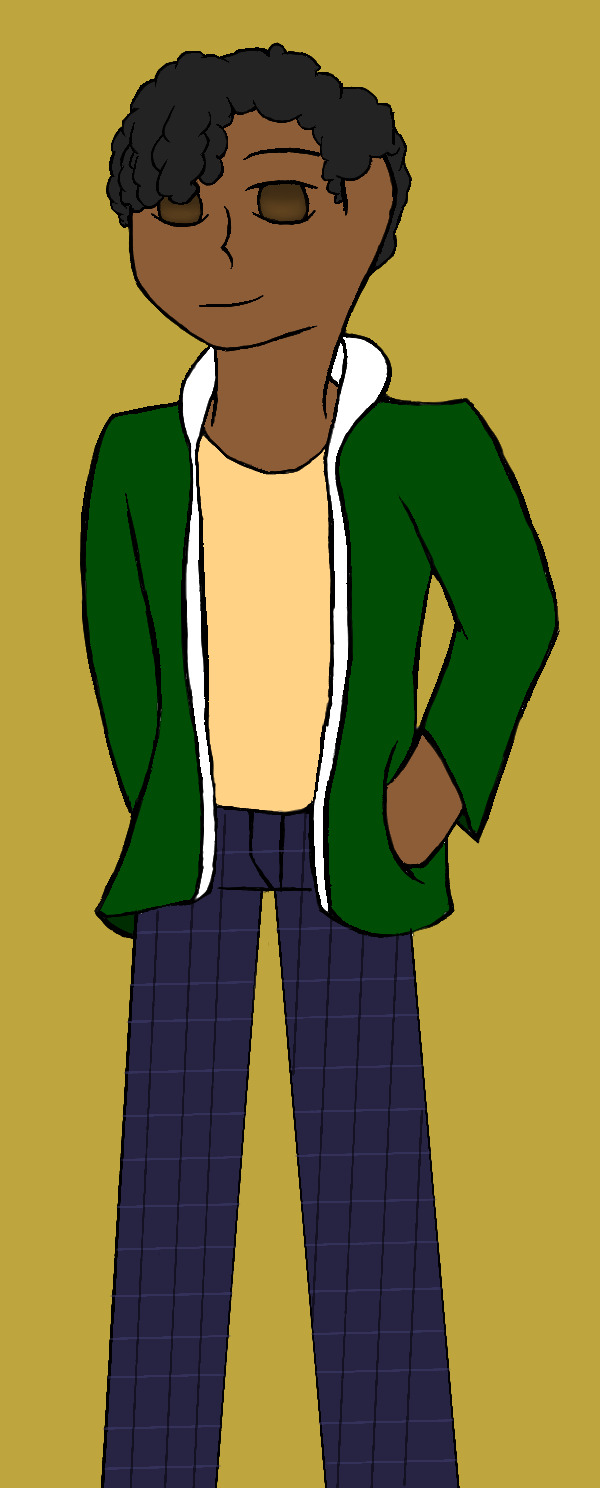
Oh and here's Cassie and Fang

Bushimaru
Pronounced (Boo-she-ma-rue)
His nickname is Levi because I based his appearance on Levi from Obey Me! Sorry not sorry. He is the leader of a Yukuza style gang called Bakesama. I'm trying to learn Japanese and in my nonsense attempt to make a unique name, I came up with this. I took Bakemono (monster) and added the honorific -sama to essentially mean "Lord of the Monsters." Their group saying is "We are children of the earth. We respect those we share a world with; if not, then like the monster you are, you'll be sent back to where you belong." They go after anyone who cannot be tried under the eyes of the law or someone who gets away with a crime based on power, money or influence.
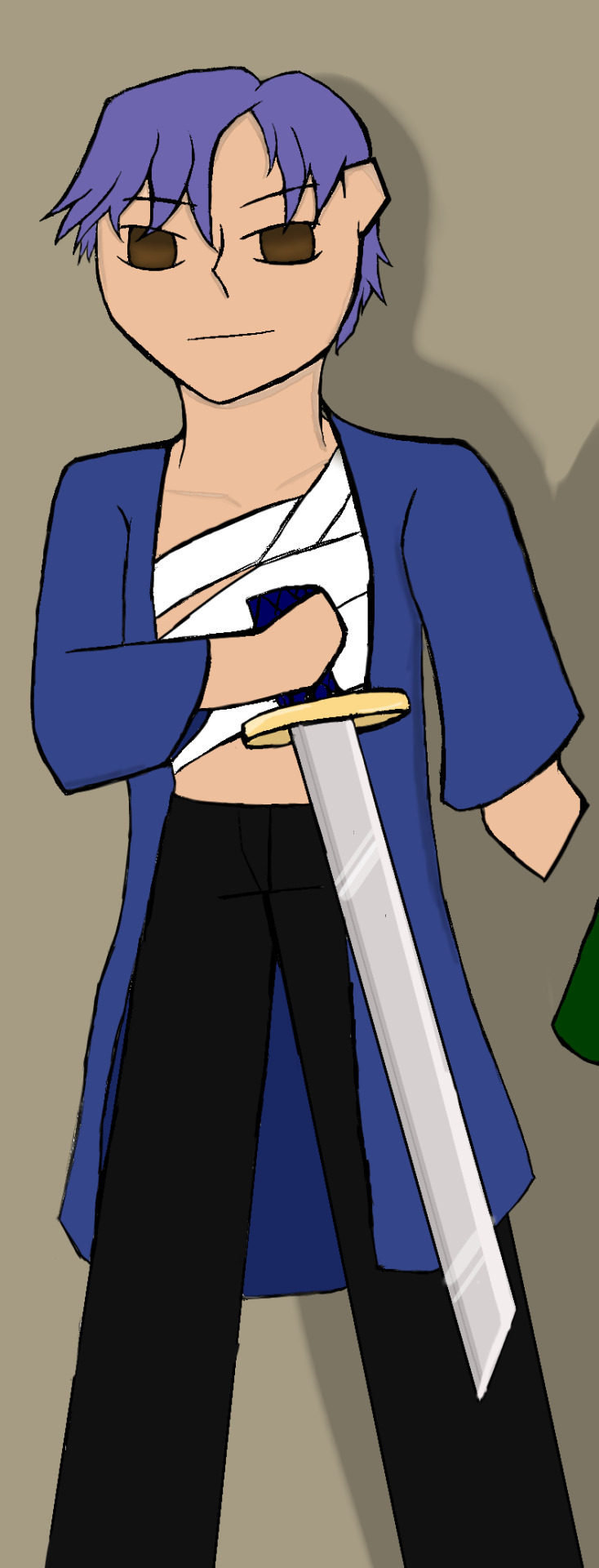
Danai
Pronounced (Dan-eye)
! Trigger warning for domestic and other forms of abuse !

A victim of childhood abuse from her father, Dani has a strong dislike for men and created a safe group for battered women, abused young girls and small children of any gender called Celestial Haven. She aims to catch "john doe" in the act by setting them up or outright exposing them. Her group also infiltrates the lives of the rich and powerful by dating or being the "sugar baby" of the individual. She made a safe space for women who have had any kind of violence or crime acted against them and actively turns men away unless they prove they're "one of the good ones"
Cecilia
I think this is a normal name lol
Cece is the head of the Costa Family which is a mob family. While she has many duties, her main goal is to eliminate anyone who unnecessarily puts her city in harms way. So drug and weapon trafficking are her main concern. She's friends with many high ranking officials including the chairman of the joint chiefs of staff. Cece is known for her beauty and she uses that to her advantage, getting meetings with people who would otherwise wouldn't even look in her direction.
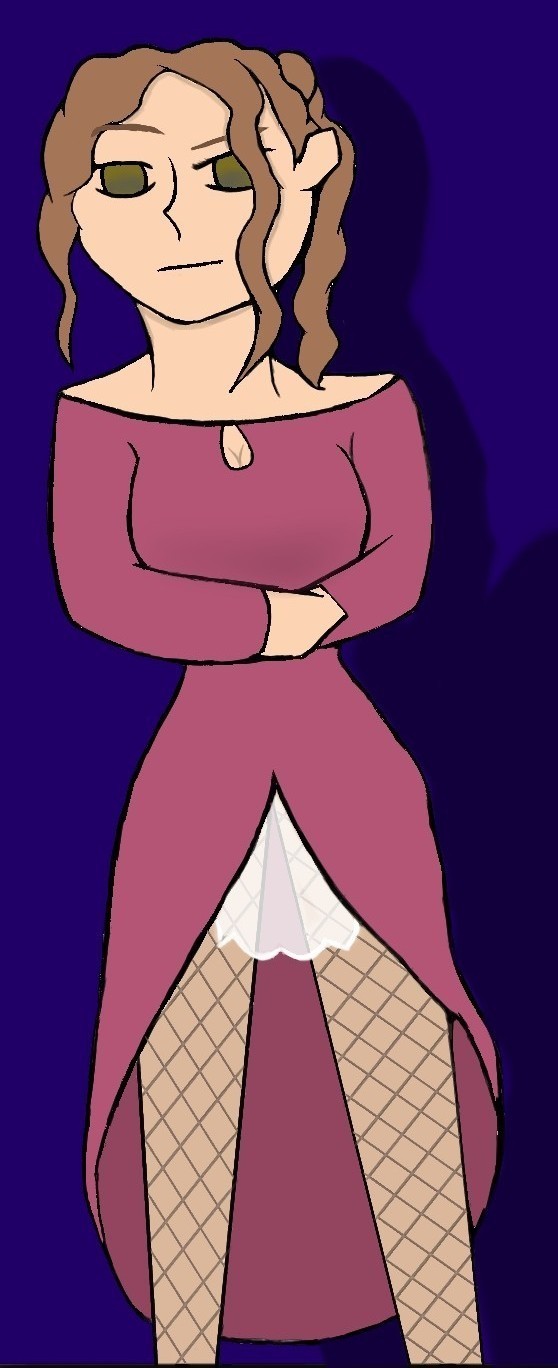
Emeryk
Pronounced (Em-mer-rick)
A young genius who at the age of 15 engineered a biochemical weapon. He doesn't really care who wants something made, his group is formed based on their desire to experiment and find new ways to old solutions. Their group is named the Chemical Compound, but they themselves don't often refer to themselves as so. Their desire is to learn and experiment on things no one else will. So if someone approaches them with a less than appropriate offer, if they take an interests in it, they'll help regardless of the problems that may arrise.
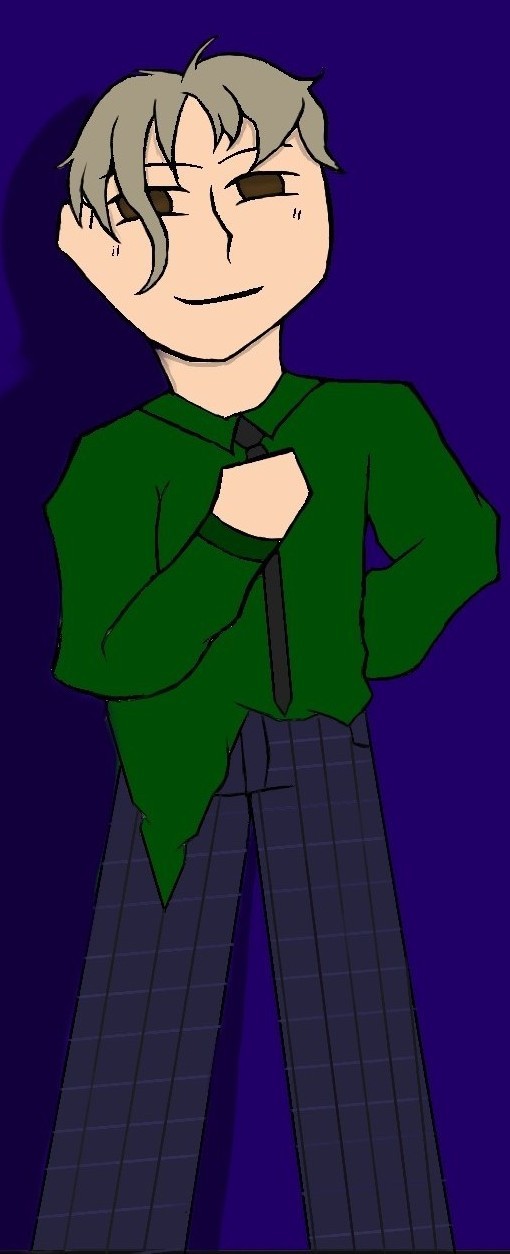
Now, onto the main antagonists.
This story does have a "man vs. Society" conflict, but it only happened because of these two:
Gavin and Jayvee Reller
Two of the most infamous individuals. Born as twins, by the time they were in middle school, they were controlling most of the city by their good looks and charm or by brute force. They both take any means necessary to get what they want and there's not a single person who wants to be on their bad side.
Gavin (left) is the older of the two (by two minutes) and is charming to a degree that's almost frightening. He's good with his words and has a way of understanding exactly how people act and feel just by speaking with them. Out of the two, everyone fears him the most.
Jayvee (right) talks more with his fists and is constantly used as their "muscle." However, he's not just brawn and has a similar manipulative streak about him. He uses his good looks against women to con them into doing what he wants. Anyone who doesn't listen, he makes it his mission to break them.

I made this story based on the feeling that the world I grew up in as a kid felt anxiety inducing. The internet was (and still is) a dangerous place for kids, the world was crumbling right before my eyes and it never felt like any adult could understand the fear I held for growing up or even going outside. I wanted to physically show that and I think I did a good job considering some of the things I heard from people as a kid.
Also, this is a manifestation of my love for True Crime and Psychology. So there's that too lol.
< The Demonic Repentance
> A Fourth Dimension Reality (TBA)
#my writing#creative writing#writing#writing community#writing side of tumblr#female writers#women writers#writeblr#writeblur#writers of tumblr#original world#my worldbuilding#world building#worldbuilding#ya story#ya writers#worldbuilding series
0 notes
Text
Western marxism Ch 1.2
2) … and the [events] of October 1917 in the east
The first world war doesn’t provoke the same emotions in Asia as we saw in Europe, and not only because the battle grounds are thousands of miles apart. In the colonies and semi-colonies, the capitalist-colonist system had revealed it’s terrible load of oppression and violence long before august 1914. For china, the tragic even was clearly the opium wars. Between 1851 and 1864, in an attempt to neutralize the “British drug traffickers” and put an end to the opium trade, whose devastating effects were in plain view for the whole world, the Taiping rebellion was developing, “the bloodiest civil war in world history, estimated to produce between 20 million and 30 million dead.” After powerfully contributing to provoking it, the west then moves to benefit from it, as it’s able to extend its control over a country that is torn and defenseless. What follows is a historic period in which “china is crucified” (since russia and Japan join the ranks of the western butchers). And the “western canons” and “the most terrible insurrections in history” are joined by “natural catastrophes” , against which a devastated country can’t muster the least resistance: “undoubtedly, the number of victims has never been so great in the history of the world.”
Compared to this immense tragedy, the outbreak of the first world war is a small thing. Urged to intervene on the side of Great Britain, Sun Yat Sen, president of the republic that surged from the revolution of 1911 and the overthrow of the Manchu dynasty, “made clear to Lloyd George in a famous letter that the disputes between whites did not interest china”: the victory of this or that group would not change in the least the capitalist and colonist attitude of the west. On the other hand, the bolshevik rise to power made Sun Yat Sen feel the hope of the end of the tragedy begun by the opium wars, and this rose his enthusiasm. Not only does it promise to put an end to the war, but especially colonial slavery.
This second aspect is the one that will lead the Chinese leader to take stock of a chapter of history whose conclusion can finally be glimpsed thanks to the October revolution: “the redskins of America have already Been exterminated”, and a similar fate looms over the rest of the colonies, including china. The situation is desperate; but suddenly one hundred and fifty million men of the slavic race have risen to oppose imperialism, capitalism, to combat inequality, and to defend humanity.” And just like that, “ a great hope for humanity is born which no one saw coming: the Russian revolution.” Naturally, imperialism responds in short order: “the world powers have attacked Lenin because they wish to destroy a prophet of humanity”, who will be hard pressed to reneg on his call for the liberation of people oppressed by colonial domination. It’s true that Sun Yat Sen is not a marxist or communist, but the foundation of the Chinese communist party of July 1st 1921 can only be understood through the “great hope” described by him with perhaps naive words, but because of that much more effective.
In light of all this, the characterization of the 20th century as a “brief century”, which according to Eric Hobsbawm begins with the traumatic experience of the first world war, suffers of eurocentrism. In the intervention of the delegates from indo-china in the Tours congress of the French socialist party, in December 26 1920, we find an ante litteram critique with a similar vision:
“It’s been half a century since French capitalism arrived at indochina. We’ve been conquered at gunpoint in the name of capitalism; since then, not only have we been shamefully subjugated and exploited […] I find it impossible, in the few minutes that I have, to list all the atrocities committed by the bandits of capital in indochina. The prisons, much more numerous than the schools, are always open and terrifyingly overpopulated. Any native that is suspected of having socialist ideals is imprisoned and sometimes even condemned to death without trial. Here, the so called indochinese justice has two weights and two measures: the Annamites do not enjoy the same guarantees as the europeans and the europeanized.”
Having pronounced this terrible accusation, the Indochinese delegates, (which later would become famous throughout the world thanks to Ho Chi Minh) conclude: we see in the adherence to the third international the formal promise that the socialist party will finally give colonial problems the importance they deserve. Despite the cautious tone, far removed from all polemics, one points stands out with clarity: The turning point in world history is not august 1914, which sees a tragedy that has been unfolding in the colonies propagating in Europe as well, but October 1917, that is, the revolutions which arouse the hope of the end of that same tragedy also in the colonies.
Already Lenin, obviously, highlighted the horror of colonialism: “the most liberal and radical politicians of a free great Britain became full fledged Gengis kan’s when it came to governing in India.” Before then, they had the lessons of Marx, denouncing liberal England for their treatment of Ireland (a colony located in Europe): a policy more despicable than that which tsarist and autocratic russia carried out over Poland; a policy so terroristic to the point that it was “unheard of in Europe” and can only be compared with the “Mongols”. As attested by ho chi Minhs call to his party comrades urging them not to lose sight of the colonial question, understandably, Marx’s lesson over the macroscopic exclusionary clauses of liberal freedom found more attentive ears in the east than in the west. This is a relevant difference, but it will undoubtedly not be the last.
0 notes
Note
Not you saying there's nothing about you being negative when you search your name as if posts about you dismissing male victims of abuse just to support a problematic white woman and other users calling you out pls 💀
Listen, this was really fun for a while, but you're making me have to be serious, which obviously isn't fun. So let me read you a bit.
First off, you're lying. Your "posts about you dismissing male victims of abuse" claim isn't a thing at all. The closest thing to a call out post re: me that you'll be able to find in my tag is someone putting me on a block list with random people and ZERO explanation of why. On top of that, that very person has a reputation of making random blocklists for people, and putting them on there despite them being generally left-leaning social liberals who would agree with them on anything. Searching that person's url will bring that up in two seconds. These posts you're pretending to say exist literally don't.
I also know you're lying because never have I ever on my page "dismissed male victims of abuse." If you're trying to reference how I speak out against how Amber Heard was publicly harassed by her abusive ex-husband last year, I don't know what to tell you. I mean, you're trying to defend a loser drunk who has a long history of preying on young and vulnerable women/girls, as well as abuse and violence, who literally texted his friend how he wanted to violently murder her for giggles. I've seen abuse victims deal with that trauma in a lot of ways, and never have I seen one do something like that. Seen plenty of abusers do that, though.
Whether or not Amber Heard is "problematic," it doesn't mean she is incapable of being a victim of abuse and/or misogyny. Implying her being "problematic" immediately means she can't be a victim of these things plays into the perfect victim mindset that literally kills women because, remember, a perfect victim is a dead victim. If a cop racially profiled Kanye West tomorrow and shot and killed him, we would still be upset over the racism of that action despite Kanye being...like that. Someone can hold disgusting views and you can still be disgusted with the way they are oppressed. If Amber not being a perfect victim means she can't be a victim of abuse to you, then that really shows how immature and unintelligent you are. Someone can harbor disgusting views and still be part of a marginalized identity and be a victim to being marginalized. The only way you can say that's not the case is if you believe women are not oppressed. And if we can't even agree on that, then please leave my page because I don't deal with anti-feminists in any capacity.
And to my last point, I really want you to think long and hard about why you decided to take this here over a tag on a fucking gifset. I didn't add to the post, I didn't find the man (whoever he is) to harass him, I didn't go on twitter or online sites where he'd likely see these comments to say this; it was just a random thought I had and wanted to share. The man obviously had work done, at least botox. That's just straight facts. If that annoyed you, a simple unfollow or block would do. If you wanted to send one "hey, that was shitty of you" ask on your way out, then fine.
But you spent all day basically going through my blog looking for things to criticize. You talked about wanting to see what I looked like, obviously so you mock me. You're in my inbox lying about what is being said about me in order to make it seem like I'm some monster. I'm just a random person on tumblr, the least influential social media site, shitposting in my spare time. That's it. There was no reason to take this to this point.
And this is what I mean about the way kpoppies make this not fun. I couldn't reblog something and add something cheeky in the tags without being harassed? All of this over "#idk who this man is but his plastic surgery is very distracting and ugly looking#you get work done then wanna load up on Botox why?" Really? I said a man's botox looked ugly and that warrants you trying to make me look like some horrible person who hates abuse victims or something? Does that even make sense? "Oh, this person dunked on my bias' botox: SHE MUST HATE AND DISMISS ABUSE VICTIMS!"
Like, hello? It's just kpop. It's a billion dollar industry that fuels overworking, eating disorders, body dysmorphia, depression and anxiety, capitalism and consumerism, racism, and misogyny. It doesn't need your defending. And if you decided you didn't like me just for insulting him, that's fine too. You don't need to do that thing where you try to make me "problematic" (I'm not lol) so you can justify it; it's okay to just not like people sometimes. My feelings are not hurt. You are not the first to dislike me, nor will you be the last.
I get that it's the internet and it's easy to not consider the problematic thinking and action patterns that you're engaging in, but when you find yourself rabidly going through someone's page to find "dirt," making up lies about people talking about/calling them out, and sending out hate messages after hate messages, then it's time to log off and take a step back. If you believe yourself to be a good person, and I'm sure you do, then now is a time for self reflection. Be a little self aware. Is this what good people who wish to spread positivity do? Do they send hate anons to strangers all over someone wanting to be a hater for a minute?
So I'm going to turn off anonymous messaging and put you in a bit of a time out so you can calm down and think about how inappropriate you're being. I don't take abuse lightly as I am very familiar with it, and so I will not tolerate you trying to use it as a gotcha all over a fucking gifset of a few kpop idols. One day, I hope you remember your actions today and cringe at how ridiculous you were being. And I really hope you're currently at an age where you'd be able to laugh and think "what a dumb child I was."
1 note
·
View note
Text
Jumping off @kidrat ’s recent post on JKR, British transphobia, and transphobia against transmasculine people, after getting a bit carried away and too long to add as a comment:
A major, relatively undiscussed event in JKR’s descent into full terfery was this tweet:
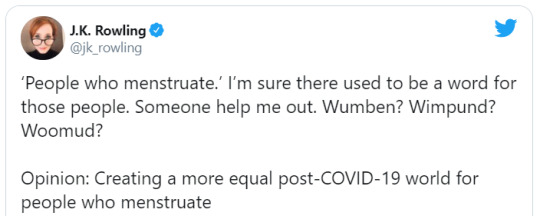
[image id: a screenshot of a tweet from JK Rowling reading: “’People who menstruate.’ I’m sure there used to be a word for those people. Someone help me out. Wumben? Wimpund? Woomud?”
Rowling attaches a link to an article titled: “Opinion: Creating a more equal post-COVID-19 world for people who menstruate” /end id]
This can seem like a pretty mundane TERF talking point, just quibbling over language for the sake of it, but I think it’s worth discussing, especially in combination with the idea that cis women like JKR see transmasculine transition as a threat to their womanhood. (Recite it with horror: ”If I were young now, I might’ve transitioned...”)
A lot of people, pro- or anti-transphobe, will make this discussion about whether the term “woman” should include trans women or not, and how cis women are hostile to the inclusion of trans women. And that’s absolutely true. But the actual language cis women target is very frequently being changed for the benefit of trans men, not trans women, and most of them know this.
Cis people are used to having their identities constantly reaffirmed and grounded in their bodies. A lot of cis women, specifically, understand their social and physical identities as women as being defined by pain: misogynistic oppression is equated to the pains of menstruation or childbirth, and both are seen as the domain of cis women. They’re something cis women can bond over and build a “sisterhood” around, and the more socially aware among them can recognise that cis women’s pain being taken less seriously by medicine is not unrelated to their oppression. However, in the absence of any trans perspectives, these conversations can also easily become very territorial and very bioessentialist.
Therefore... for many cis women, seeing “female bodies” described in gender neutral language feels like stripping their pain of its meaning, and they can become very defensive and angry.
And the consequences for transmasculine people can be extremely dangerous.
Not only do transmasculine people have an equal right to cis women to define our bodies as our own... Using inclusive language in healthcare is about more than just emotional validation.
The status quo in healthcare is already non-inclusive. When seeking medical help, trans people can expect to be misgendered and to have to explain how our bodies work to the doctors. We risk harassment, pressure to detransition, pressure to sterilise ourselves, or just being outright turned away. And the conversation around pregnancy and abortion in particular is heaving with cisnormativity - both feminist and anti-feminist cis women constantly talk about pregnancy as a quintessentially female experience which men could never understand.
Using gender-neutral language is the most basic step possible to try and make transmasculine people safer in healthcare, by removing the idea that these are “women’s spaces”, that men needing these services is impossible, and that safety depends on ideas like “we’re all women here”. Not institutionally subjecting us to misgendering and removing the excuse to outright deny us treatment is, again, one of the most basic steps that can be taken. It doesn’t mean we’re allowed comfort, dignity or full autonomy, just that one major threat is being addressed. The backlash against this from cis women is defending their poorly developed senses of self... at the cost of most basic dignity and safety for transmasculine people.
Ironically, though transphobic cis women feel like decoupling “women’s experiences” from womanhood is decoupling them from gendered oppression, transmasculine people experience even more marginalisation than cis women. Our rates of suicide and assault are even higher. Our health is even less researched than cis women’s. Our bodies are even more strictly controlled. Cis women wanting to define our bodies on their terms is a significant part of that. They hold the things we need hostage as “women’s rights”, “women’s health”, “women’s discussions” and “support for violence against women”, and demand we (re-)closet ourselves or lose all of their solidarity.
Fundamentally, the problem is that transphobic cis women are possessive over their experiences and anyone who shares them. Because of their binary understanding of gender, they’re uncomfortable with another group sharing many of their experiences but defining themselves differently. They’re uncomfortable with transmasculine people identifying “with the enemy” instead of “with their sisters”, and they’re even more uncomfortable with the idea that there are men in the world who they oppress, and not the other way around. “Oppression is for women; you can’t call yourself a man and still claim women’s experiences. Pregnancy is for women; if you want to be a man so badly why haven’t already you done something about having a woman’s body? How dare you abandon the sisterhood while inhabiting one of our bodies?”
Which brings me back to the TERF line about how “If I were young now, I might have transitioned.”
I’m not saying Rowling doesn’t actually feel any personal connection to that narrative - but it is a standard line, and it’s standard for a reason. Transphobic cis women really believe that there is nothing trans men go through that cis women don’t. They equate our dysphoria to internalised misogyny, eating disorders, sexual abuse or other things they see as “female trauma”. They equate our desire to transition to a desire to escape. They want to “help us accept ourselves” and “save us” from threats to their sense of identity. The fact is, this is all projection. They refuse to consider that we really have a different internal experience from them.
There’s also a marked tendency among less overtly transphobic cis women, even self-proclaimed trans allies, to make transphobia towards trans men about cis women.
Violence against trans men is chronically misreported and redefined as “violence against women”. In activist spaces, we’re frequently told that any trauma we have with misogyny is “misdirected” and therefore “not really about us”. If we were women, we would’ve been “experiencing misogyny”, but men can’t do that, so we should shut up and stop “talking over women”. (Despite the surface difference of whether they claim to affirm our gender, this is extremely similar to how TERFs tell us that everything we experience is “just misogyny”, but that transmasculine identity is a delusion that strips us of the ability to understand gender or the right to talk about it.)
I have personally witnessed an actual N*zi writing an article about how trans men are “destroying the white race” by transitioning and therefore becoming unfit to carry children, and because the N*zi had misgendered trans men in his article, every response I saw to it was about “men controlling women’s bodies”.
All a transphobe has to do is misgender us, and the conversation about our own oppression is once again about someone else.
Transphobes will misgender us as a form of violence, and cis feminist “allies” will perpetuate our misgendering for rhetorical convenience. Yes, there is room to analyse how trans men are treated by people who see us as women - but applying a simple “men oppressing women” dynamic that erases our maleness while refusing to even name transphobia or cissexism is not that. Trans men’s oppression is not identical to cis women’s, and forcing us to articulate it in ways that would include cis women in it means we cannot discuss the differences.
It may seem like I’ve strayed a long way from the original topic, and I kind of have, but the central reason for all of these things is the same:
Trans men challenge cis women’s self-concept. We force them to actually consider what manhood and womanhood are and to re-analyse their relationship to oppression, beyond a simple binary patriarchy.
TERFs will tell you themselves that the acknowledgement of trans people, including trans men, is an “existential threat” that is “erasing womanhood” - not just our own, but cis women’s too. They hate the idea that biology doesn’t determine gender, and that gender does not have a strict binary relationship to oppression. They’re resentful of the idea that they could just “become men”, threatened by the assertion that doing so is not an escape, and completely indignant at the idea that their cis womanhood could give them any kind of power. They are, fundamentally, desperate not to have to face the questions we force them to consider, so they erase us, deflect from us, and talk over us at every opportunity.
Trans men are constantly redefined against our wills for the benefit of cis womanhood.
TL;DR:
Cis women find transmasculine identity threatening, because we share experiences that they see as foundational to their womanhood
The fact that transphobes target inclusive language in healthcare specifically is not a mistake - They do not want us to be able to transition safely
Cis women are uncomfortable acknowledging transphobia, so they make discussion of trans men’s oppression about “womanhood” instead
This can manifest as fully denying that trans men experience our own oppression, or as pretending trans men’s experiences are identical to cis women’s in every way
#transphobia#transmasculinity#transandrophobia#this could maybe do with one more proofread but i've spent way too long on this so whatever!
781 notes
·
View notes
Text
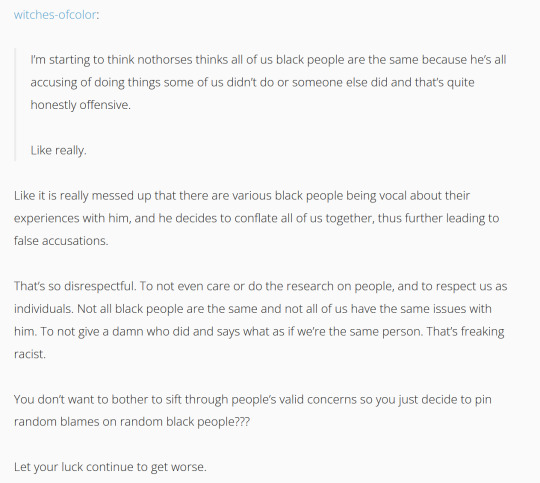
I'm not really interested in engaging with some rando who thinks they deserve my time or energy just because they're mad enough at me.
I do, however, want to be very clear here on where I stand with these issues & the way I believe these things should be handled- not for the sake of my reputation (which honestly, who gives a shit)- but because I know there are people looking up to me & defending me over this stuff, and I want my example to be a decent one.
So, hi!
To my knowledge, the "complaints against black people" referenced here are against three specific harassers who happen to be black; not for anything actually related to black issues, but for the fact that these three people have been engaging in, encouraging, and leading a harassment campaign against me and several other prominent transmascs (along with a string of other trans people, black people, native american people, etc.) for the better part of a year now.
I absolutely understand that white people will commonly weaponize their whiteness to frame black people unfairly as aggressors, in order to provoke violence against them.
I have made every effort, on my part, to consider the situation carefully and ensure I'm not making any unfair accusations. I have chosen the names I've named because they've targeted me most consistently, and have been the source of the bulk of the violent comments and anons I've received over this.
If anyone believes the complaints I've raised against these three (witches-ofcolor, visibilityofcolor, and bifey) are unfair, I think that's valid. I don't care if people dislike me, block me, etc.; you don't owe me space in your life. I don't owe you mine.
I've just asked that folks look into the situation themselves to form their own opinions. I also insist that people do not attempt to contact any of these people on my behalf (or, preferably, at all).
I also want to point out that their harassment has not by any means targeted me exclusively, and most of what I've talked about wrt the situation has been their harassment of others.
The original callout post I am being accused of these things for defending is about a Mestizo trans man. At least two of the people they've lumped into this specific situation are also black. Another is mixed. Witches-ofcolor and visibilityofcolor (who regularly reblog each other's relevant posts in support) have routinely attempted to erase or outright deny these people's races, from referring to some of them as "white" regardless of their actual race/ethnicity, to deeming them "white-aligned" for being defended by a few white people, to calling one "oreo"- i.e., a racist slur.
I'm not here to tokenize people; I don't think it's fair to boil an argument down to "how oppressed is your side?". I point these things out because I think it's important that we acknowledge the trend here of questioning, erasing, and denying people of color's identities in order to make their "side" seem more legitimate. I don't think anyone gets to be the authority on what someone else's race "actually" is, especially not based on, y'know, internet drama.
That said:
If I have done or said something racist, please tell me. If I have attributed actions to a group unfairly, please tell me. If you feel I am racist, I would agree that being white makes me uniquely prone to racism- and please tell me what I'm doing wrong, and what is making you uncomfortable. Please be specific. Please include examples, to the best of your ability.
If I don't know what I'm doing wrong, I can't fix it; and I would very much like to avoid hurting anyone. I would very much like to continue working to unlearn racism, and to do my best to be an ally and accomplice to people of color. And I would like to undo any harm I've already caused, to the best of my ability.
I am also thinking for myself- and that means I am identifying when I believe criticism is being made in bad faith. I approach this with critical thought because I think it's important that I learn and understand for myself what racism looks like, how it works, and how to deconstruct (or at minimum, avoid supporting) it. Relying on the word of people of color without ever actually doing the work to understand it means that I will forever be relying on their emotional labor; and I don't think that's fair, or helpful.
Thinking critically, apologizing when I turn out to be wrong, and working to do better is about the best I or anyone else can do. You don't have to be cool with every conclusion I come to, but I think it's fair to ask that people look into things themselves and avoid sending harassment, spreading rumors, or making public threats of violence.
64 notes
·
View notes
Photo
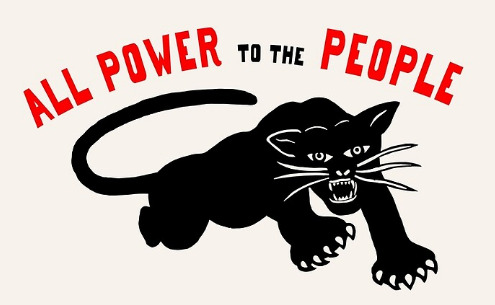
Black Panther Party, original name Black Panther Party for Self-Defense, African American revolutionary party, founded in 1966 in Oakland, California, by Huey P. Newton and Bobby Seale.
The party’s original purpose was to patrol African American neighborhoods to protect residents from acts of police brutality. The Panthers eventually developed into a Marxist revolutionary group that called for the arming of all African Americans, the exemption of African Americans from the draft and from all sanctions of so-called white America, the release of all African Americans from jail, and the payment of compensation to African Americans for centuries of exploitation by white Americans. At its peak in the late 1960s, Panther membership exceeded 2,000, and the organization operated chapters in several major American cities.
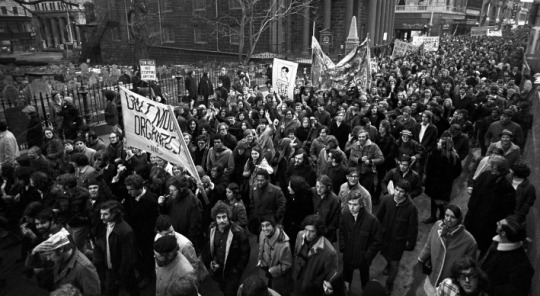
Origin and political program
Despite passage of the 1960s civil rights legislation that followed the landmark U.S. Supreme Court ruling in Brown v. Board of Education of Topeka (1954), African Americans living in cities throughout North America continued to suffer economic and social inequality.
Poverty and reduced public services characterized these urban centers, where residents were subject to poor living conditions, joblessness, chronic health problems, violence, and limited means to change their circumstances. Such conditions contributed to urban uprisings in the 1960s (such as those in the Watts district of Los Angeles in 1965, among others) and to the increased use of police violence as a measure to impose order on cities throughout North America.
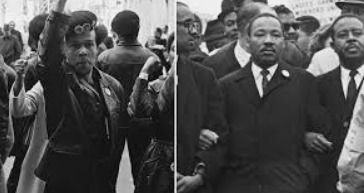
It was in this context, and in the wake of the assassination of Malcolm X in 1965, that Merritt Junior College students Huey P. Newton and Bobby Seale founded the Black Panther Party for Self-Defense on October 15, 1966, in West Oakland (officially “Western Oakland,” a district of the city of Oakland), California.
Shortening its name to the Black Panther Party, the organization immediately sought to set itself apart from African American cultural nationalist organizations, such as the Universal Negro Improvement Association and the Nation of Islam, to which it was commonly compared.
Although the groups shared certain philosophical positions and tactical features, the Black Panther Party and cultural nationalists differed on a number of basic points. For instance, whereas African American cultural nationalists generally regarded all white people as oppressors, the Black Panther Party distinguished between racist and nonracist whites and allied themselves with progressive members of the latter group.
Also, whereas cultural nationalists generally viewed all African Americans as oppressed, the Black Panther Party believed that African American capitalists and elites could and typically did exploit and oppress others, particularly the African American working class.
Perhaps most importantly, whereas cultural nationalists placed considerable emphasis on symbolic systems, such as language and imagery, as the means to liberate African Americans, the Black Panther Party believed that such systems, though important, are ineffective in bringing about liberation. It considered symbols as woefully inadequate to ameliorate the unjust material conditions, such as joblessness, created by capitalism.
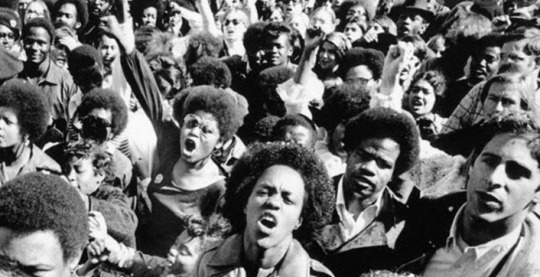
From the outset, the Black Panther Party outlined a Ten Point Program, not unlike those of the Universal Negro Improvement Association and Nation of Islam, A number of positions outlined in the
From the outset, the Black Panther Party outlined a Ten Point Program, not unlike those of the Universal Negro Improvement Association and Nation of Islam, to initiate national African American community survival projects and to forge alliances with progressive white radicals and other organizations of people of color.
A number of positions outlined in the Ten Point Program address a principle stance of the Black Panther Party: economic exploitation is at the root of all oppression in the United States and abroad, and the abolition of capitalism is a precondition of social justice. In the 1960s this socialist economic outlook, informed by a Marxist political philosophy, resonated with other social movements in the United States and in other parts of the world. Therefore, even as the Black Panther Party found allies both within and beyond the borders of North America, the organization also found itself squarely in the crosshairs of the Federal Bureau of Investigation (FBI) and its counterintelligence program, COINTELPRO. In fact, in 1969 FBI director J. Edgar Hoover considered the Black Panther Party the greatest threat to national security.
Source:Britannica.com - Black Panther Party Legacy
Black Paraphernalia Disclaimer - images from Google images
PART 2 ALL ABOUT THE BLACK PANTHERS

Ten Point Program address a principle stance of the Black Panther Party: read below for the 10 point which was the pillar of the party
1. We want freedom. We want power to determine the destiny of our Black and oppressed communities.
We believe that Black and oppressed people will not be free until we are able to determine our destinies in our own communities ourselves, by fully controlling all the institutions which exist in our communities.
2. We want full employment for our people.
We believe that the federal government is responsible and obligated to give every person employment or a guaranteed income. We believe that if the American businessmen will not give full employment, then the technology and means of production should be taken from the businessmen and placed in the community so that the people of the community can organize and employ all of its people and give a high standard of living.
3. We want an end to the robbery by the capitalist of our Black and oppressed communities.
We believe that this racist government has robbed us and now we are demanding the overdue debt of forty acres and two mules. Forty acres and two mules were promised 100 years ago as restitution for slave labor and mass murder of Black people. We will accept the payment in currency which will be distributed to our many communities. The American racist has taken part in the slaughter of over fifty million Black people. Therefore, we feel this is a modest demand that we make.
4. We want decent housing, fit for the shelter of human beings.
We believe that if the landlords will not give decent housing to our Black and oppressed communities, then the housing and the land should be made into cooperatives so that the people in our communities, with government aid, can build and make decent housing for the people.
5. We want education for our people that exposes the true nature of this decadent American society. We want education that teaches us our true history and our role in the present-day society.
We believe in an educational system that will give to our people a knowledge of self. If you do not have knowledge of yourself and your position in the society and the world, then you will have little chance to know anything else.
6. We want completely free health care for all Black and oppressed people.
We believe that the government must provide, free of charge, for the people, health facilities which will not only treat our illnesses, most of which have come about as a result of our oppression, but which will also develop preventative medical programs to guarantee our future survival. We believe that mass health education and research programs must be developed to give all Black and oppressed people access to advanced scientific and medical information, so we may provide ourselves with proper medical attention and care.
7. We want an immediate end to police brutality and murder of Black people, other people of color, all oppressed people inside the United States.
We believe that the racist and fascist government of the United States uses its domestic enforcement agencies to carry out its program of oppression against Black people, other people of color and poor people inside the United States. We believe it is our right, therefore, to defend ourselves against such armed forces, and that all Black and oppressed people should be armed for self-defense of our homes and communities against these fascist police forces.
8. We want an immediate end to all wars of aggression.
We believe that the various conflicts which exist around the world stem directly from the aggressive desires of the U.S. ruling circle and government to force its domination upon the oppressed people of the world. We believe that if the U.S. government or its lackeys do not cease these aggressive wars that it is the right of the people to defend themselves by any means necessary against their aggressors.
9. We want freedom for all Black and poor oppressed people now held in U.S. federal, state, county, city and military prisons and jails. We want trials by a jury of peers for all persons charged with so-called crimes under the laws of this country.
We believe that the many Black and poor oppressed people now held in U.S. prisons and jails have not received fair and impartial trials under a racist and fascist judicial system and should be free from incarceration. We believe in the ultimate elimination of all wretched, inhuman penal institutions, because the masses of men and women imprisoned inside the United States or by the U.S. military are the victims of oppressive conditions which are the real cause of their imprisonment. We believe that when persons are brought to trial that they must be guaranteed, by the United States, juries of their peers, attorneys of their choice and freedom from imprisonment while awaiting trials.
10. We want land, bread, housing, education, clothing, justice, peace and people’s community control of modern technology.
When in the course of human events, it becomes necessary for one people to dissolve the political bands which have connected them with another, and to assume, among the powers of the earth, the separate and equal station to which the laws of nature and nature’s God entitle them, a decent respect to the opinions of mankind requires that they should declare the causes which impel them to the separation.
We hold these truths to be self-evident, that all men are created equal; that they are endowed by their Creator with certain unalienable rights; that among these are life, liberty, and the pursuit of happiness. That, to secure these rights, governments are instituted among men, deriving their just powers from the consent of the governed; that, whenever any form of government becomes destructive of these ends, it is the right of the people to alter or to abolish it, and to institute a new government, laying its foundation on such principles, and organizing its powers in such form, as to them shall seem most likely to effect their safety and happiness.
Prudence, indeed, will dictate that governments long established should not be changed for light and transient causes; and, accordingly, all experience hath shown that mankind are more disposed to suffer, while evils are sufferable, than to right themselves by abolishing the forms to which they are accustomed. But, when a long train of abuses and usurpations, pursuing invariably the same object, evinces a design to reduce them under absolute despotism, it is their right, it is their duty, to throw off such government, and to provide new guards for their future security.
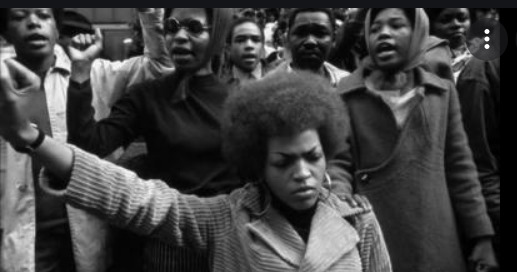
Source: Wikipedia Ten point program
Black Paraphernalia Disclaimer - images from Google images
18 notes
·
View notes
Text
I don’t need you to respect me, I respect me
I’m gonna miss writing about Amethyst.
As the most sisterly Crystal Gem, a firebrand in the new role of middle child after spending millennia as the baby of the group, Amethyst’s story is about growing from a wild teen to a responsible adult. Like Steven, she feels the need to prove that she’s a Crystal Gem too, but unlike Steven, she already is a Crystal Gem, so she carries a different kind of resentment as she continues to be treated like a child. It’s made even worse by her warrior instincts clashing with her small frame: she lives with the constant anxiety that she’s a mistake, a Gem who came out wrong and doesn’t belong in her family, so she comforts and distracts herself with hedonism and shapeshifting. Her problem goes beyond not feeling respected: deep down, she fears that she doesn’t deserve respect.
But she changes her mind.
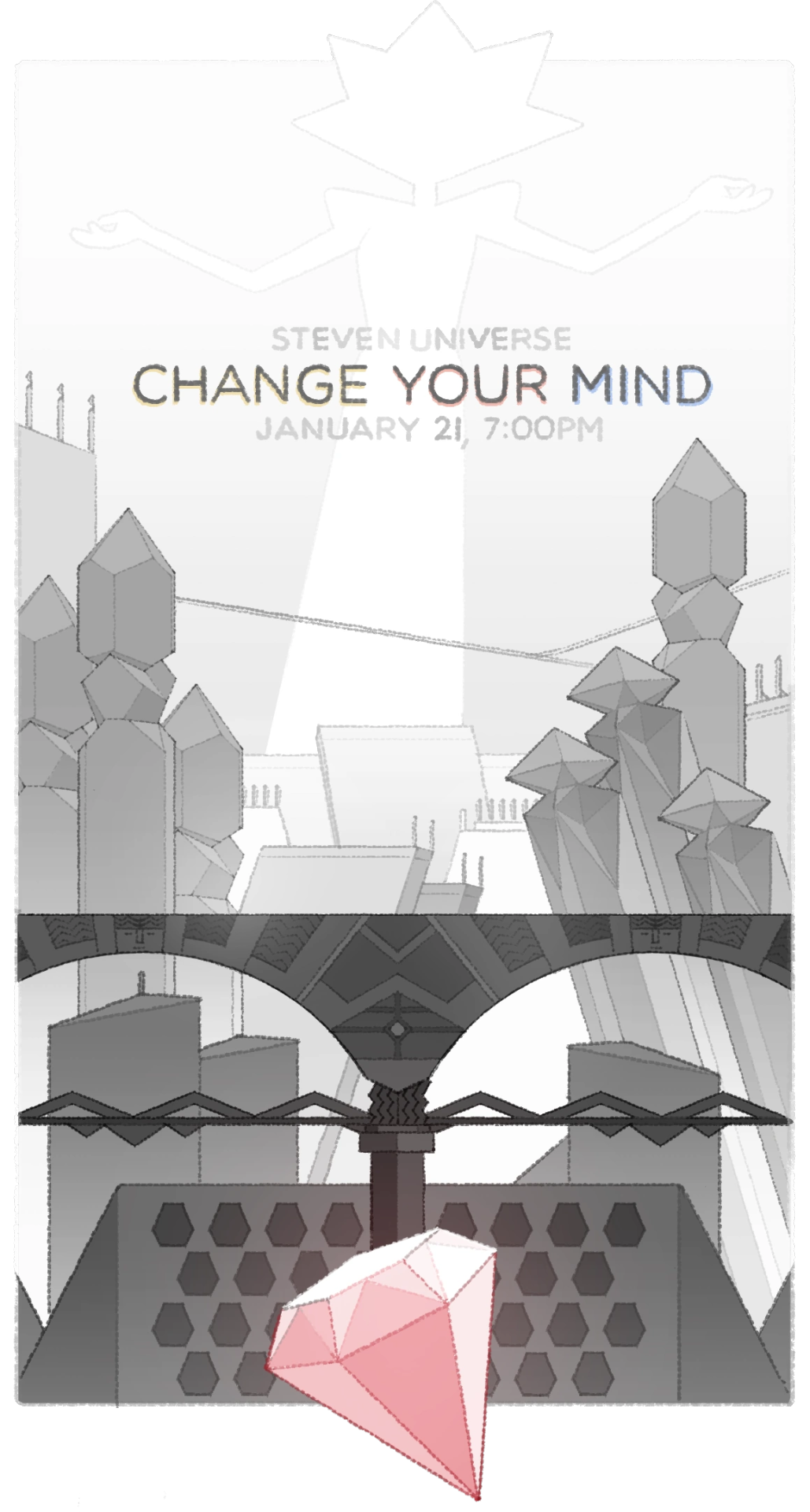
“This isn’t normal.”
The Return and Jailbreak culminated the first act of Steven Universe, giving our characters subtle achievements (Amethyst and Pearl casually fuse into Opal, Greg reveals a deeper understanding of the Gems than we once thought, Beach City comes together as a community when Steven is in danger) and huge changes (Steven summons a massive shield, Garnet’s status as a fusion is confirmed, Lapis goes from prisoner to imprisoner). While not an official finale, Beta and Earthlings culminated the second act, narrowing the focus to five characters as they each reach one milestone or another: Lapis and Amethyst find a level of peace, Peridot defends her new home, Jasper succumbs to corruption, and Steven helps his friends but fails to help his enemy.
In a way, Change Your Mind culminates the third act with an even narrower focus. Sure, it gives big moments to a ton of characters (there’s fanservice galore, and we see the three Diamonds in particular take enormous steps), but we zero in on Steven in the same way the entire act has zeroed in on Steven, because this is a story about identity. It isn’t only about who he is, but who he wants to be moving forward, and fusing all the insights he’s learned from his human family, his Crystal Gem family, and his Diamond family into a song that encapsulates his growth over the course of the series.
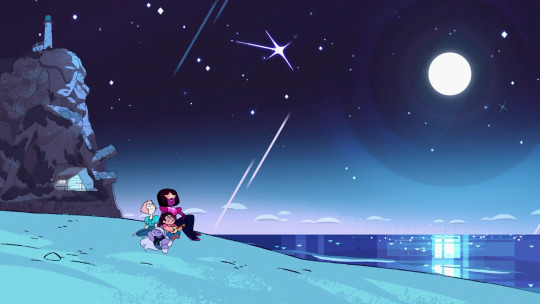
We start in the most lifelike of the Diamond dreams, so real that Steven still sees himself as Steven rather than embodying Pink. Once again, this connection emerges from sleeping in a location where Pink once dwelled, but while he wasn’t feeling her impatience and rage in Jungle Moon, nor her hardening resolve in Can’t Go Back, nor her whimsy in Familiar, this time they share the same headspace when they’re both locked in a tower.
Considering how bombastic things get in this episode, I love how low-key this final dream remains until White Diamond interferes. We’re as lost as Steven at first, worrying about Connie and baffled at Blue’s recognizable mood but incongruous accusations, but as the truth becomes clear, he transforms into Pink off-screen without any fanfare, both in body and in mind: Steven isn’t questioning Blue’s warning about Pink Pearl, Pink Diamond is apologizing for her own behavior in Zach Callison’s voice. Still, looking down jolts him out of it, and after seeing the Crystal Gems poofed at the ball for a more definitive Steven memory, we cycle in Rose’s horror at her family launching a final attack on Earth. The rapid-fire identity shifts that follow inspired the most haunting piece of promo art for the episode, drawn by Rebecca Sugar herself, but I didn’t wanna display it without a seizure warning.
It’s excellent exposition, hitting the highlights of the Diamonds’ many wrongs and establishing Steven’s fraying sense of self in a way that’s both artful and brief; it’s important to remind younger viewers about the stakes, but Change Your Mind doesn’t pretend that anyone should be watching this episode without context, so it doesn’t prioritize thorough explanation. And despite how frightening the nightmare becomes, Steven gains a new sense of clarity after seeing the pattern laid out in front of him. The Diamonds are hurting him in the same way they hurt his mother, and if he’s going to help everyone, he needs to help himself.
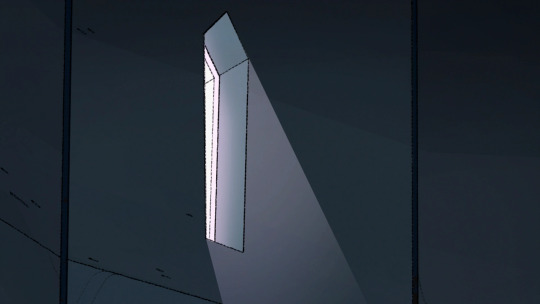
When Blue Diamond returns to the tower in modern day, Steven isn’t afraid, and he isn’t alone. The first of many puns riddling the finale emerges (“Déjà Blue!”) before Connie proves why she’s the perfect partner for our hero, platonic or otherwise. He’s terrible at confronting the people that hurt him—this would require him to acknowledge he’s hurt in the first place, which he’s also terrible at—but if she was comfortable enough with confrontation to call out her best friend when he wrongs her, Blue Diamond doesn’t stand a chance. Connie comes out swinging, loading the bases with candor and sass despite Blue’s confusion over why a human even gets an opinion about this stuff, which makes Steven’s refusal to apologize hit the Diamond like a grand slam.
I love that Steven’s flat “no” takes Connie by surprise as well as Blue, because yeah, it’s uncharacteristically blunt for someone who’s spent his entire trip to Homeworld bending over backwards like he usually does to accommodate others. When he doubles down by explaining that he isn’t sorry about creating a show that celebrates queer characters whoops sorry I mean fusion, Callison makes it sound like the most obvious thing in the world, and this is what upsets Blue enough to inflict her tears on him. We’ll learn even more about Pink’s temper in Steven Universe Future, but the simple act of not bowing to authority makes Steven “worse than ever” in Blue’s mind: violence is more acceptable than insubordination. (Also, violence in cartoons is more acceptable than queer folks just sorta existing in cartoons, but that’s neither here nor there.)
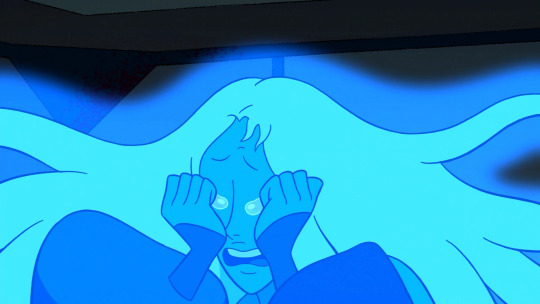
Change Your Mind is about combating bigotry and cycles of abuse, and Blue is the obvious first test. She’s a bigot who doesn’t think she’s a bigot (compared to Yellow, who doesn’t care that she’s a bigot, and White, who’s quite proud of being a bigot). She passively perpetuates a toxic status quo (compared to Yellow, who actively perpetuates it, and White, who established it in the first place). It makes sense that she’s the first of the remaining Diamonds to change her mind, because all it takes for her to realize that something is wrong is thinking about it a little harder.
This doesn’t let her off the hook, of course: Blue’s sloth—the sin, not the animal—might not look flashy next to Yellow’s wrath or White’s pride or Pink’s envy, but she still chose to do nothing for thousands of years rather than contemplate how her actions and her society might have wronged Pink. If it was this easy for Blue to realize she was hurting Pink, it makes it that much more of an issue that it took her this long to figure it out. Unintentional bigots might be the “best” option by default, but they can be just as harmful as intentional bigots, and there’s a special sort of damage that can come from an oppressor who truly believes themselves an ally.
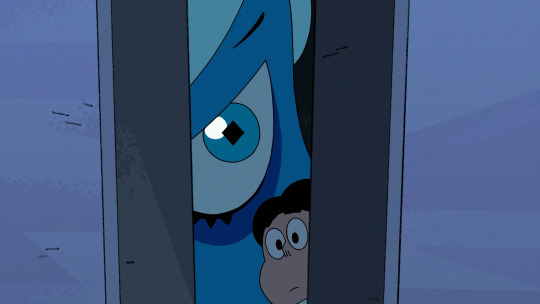
That said, while it’s important to acknowledge her blame (emphasized here when she only stops attacking Steven when he calls her out rather than the Diamonds in general), Blue is also a victim. She’s one of the most powerful beings on Homeworld, but she’s still trapped by White Diamond, and resorts to putting others down as a means of reclaiming a sense of that power. In the same way oppressed people often turn to sexism and racism and homophobia to make themselves feel bigger, Blue (and Yellow) reinforce White’s sweeping bigotry in the same way they echo her family-specific abuse. It’s not a good coping mechanism, in this show or in the real world, but understanding the problem is key to fixing it.
So it still feels like a victory when Blue turns, even though it should’ve happened ages ago, and even though she’s a tyrant. She isn’t just deciding to help Steven, she’s breaking out of that cycle in a way that allows for growth beyond our hero’s immediate concerns. Lisa Hannigan captures this transformation beautifully, shifting from manipulative whining about Pink’s behavior to a crushing realization that she’s the one who’s wrong. And even as she joins Steven’s side, she remains weighed down by her longstanding prejudice: Hannigan stutters as she refers to the Crystal Gems as his family, and her triumphant defense of Steven’s name to Yellow comes with the caveat that she’s still misgendering him.
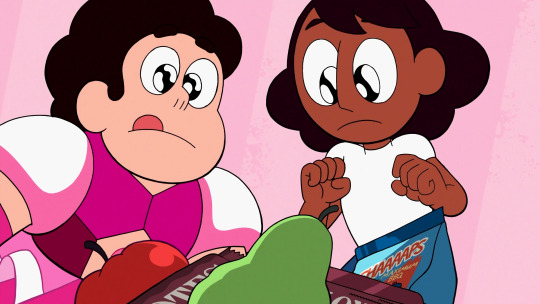
But before we get to Yellow, we take a pit stop that grounds us back to Steven and Connie’s hunger. It may seem small, but this is a critical moment in establishing Steven’s humanity in a way the show has quietly done from day one: with food.
The very first scene of Steven Universe establishes our hero’s human half in a donut shop, upset about dessert. From there, the next five episodes drill in that Steven will take a unique approach to his magical Gem heritage, and they all involve food in a major way: Cookie Cats, then his father’s saying about pork chops and hot dogs, then the Cheeseburger Backpack (important enough to be the episode’s name), then the Together Breakfast (ditto), then creating a monster based on fries.
It’s not just Steven, either. The first few Connie episodes involve eating and drinking in ways that show hints of growth (worrying about trans fats, then sneaking food into movie theaters) and mark key moments in her life (sharing a juicebox, taking her parents to dinner). Lars’s development is tied with his love of baking, and on top of him and Sadie working at the Big Donut, the Frymans and the Pizzas are so tied to their food service jobs that it’s in their names. And speaking of names, we’ve got Vidalia calling her sons Sour Cream and Onion. It even extends to the Gems: Amethyst’s connection with Earth means she loves food, and Pearl’s greater distance from humanity means she can’t stomach it.
Food is fundamentally something that humans require and Gems don’t, and just like we saw in Lars’s Head, Steven’s physical body forces him to think about his own needs despite his usual focus on others. Both his humanity and his ability to stand up for himself are key to his eventual victory, and what could’ve been a generic transition between Blue and Yellow’s big scenes instead becomes a quiet Steven scene. Steven changing into his usual clothes (including his mom’s star) and Connie changing into her own outfit (including her dad’s jacket) is the perfect finishing touch before we dive back into the drama.
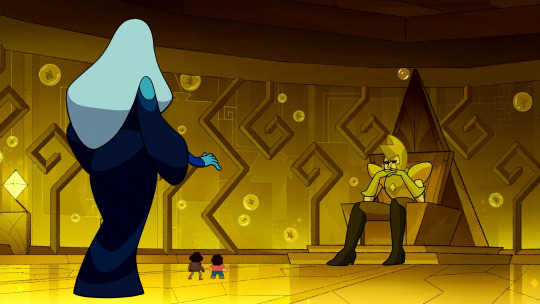
True to their natures, Yellow Diamond gets a starker introduction than Blue’s dream sequence: as the lights burst on, we get two shots focusing on a horrifying number of mutated Gem Shards floating around in the room, then the Crystal Gems’ thankfully intact gems in one big bubble, before panning down to the villain who caused all this pain. The menace is palpable before she even opens her mouth, but Patti LuPone’s low tone keeps the mood from boiling over just long enough that when she loses her cool, it hits like a freight train.
Blue’s passive bigotry endured because she lacked introspection, but Yellow’s active bigotry requires constantly justifying actions she knows are cruel by presenting it as a matter of superior reasoning. We’ve known from her first appearance that Yellow’s seething fury undermines her reputation for cold logic, and now more than ever the connection between her behavior and that of “sophisticated” bigots is clear. You know the type: openly, smugly hateful, but couching their hate as something derived from some deep knowledge about the subject, whether in religious convictions or whatever “science” they can scrape together to confirm their worldview.
Sure enough, even in her rage, Yellow lays down what she sees as a rational explanation for why it was okay to mistreat Pink, and why it’s okay that they themselves are mistreated: if they make exceptions for anyone, even other Diamonds, they must make exceptions for everyone, and chaos reigns. Besides the slippery slope being a fallacy, her argument is punctured by Connie’s second big retort of the night, pointing out that this extreme conclusion of Homeworld Gems living free actually sounds pretty nice. But you can’t force this type of bigot to change their mind through reason; if such a person was actually interested in logical worldviews, they wouldn’t have become a bigot in the first place. You need to change their heart.
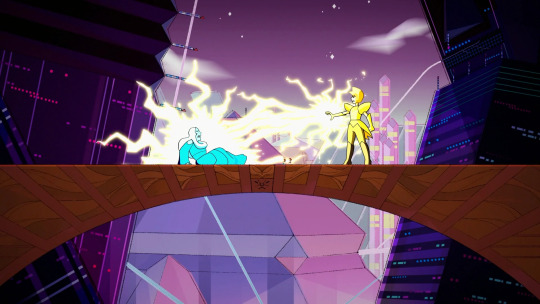
Fortunately, emotions are Blue’s domain, so she’s just the person to help. Unfortunately, in the same way she still can’t get Steven’s pronouns right, Blue lacks experience with healthy communication, and strikes a first blow against Yellow on instinct. The ensuing brawl is brutal, switching between the massive scale of two warring titans and the smaller scale of Steven and Connie scrambling to save the Crystal Gems as Blue and Yellow unload millennia of baggage on each other. It’s so important that Blue is the physical instigator here, as it fuels Yellow’s white-hot self-righteous streak like nothing else, and it keeps the fight from being one-sided all the way through: Yellow pretty much needs to be the one dealing the final blow for the scene to stick, so it gets balanced out by Blue’s opening punch.
Blue uses her powers on Yellow, and Yellow uses her powers on Blue, but Steven’s power is talking. So just like with Blue’s conversion, Connie gets the opening words while Steven gets the finisher. When he finally gets her attention after being ignored throughout the scene, he makes Yellow listen to him by using the same food-based expression I mentioned from all the way back in Laser Light Cannon. It’d pack a bigger punch if Greg said “If every pork chop were perfect, we wouldn’t have hot dogs” at literally any other point in the show, but it still does the trick.
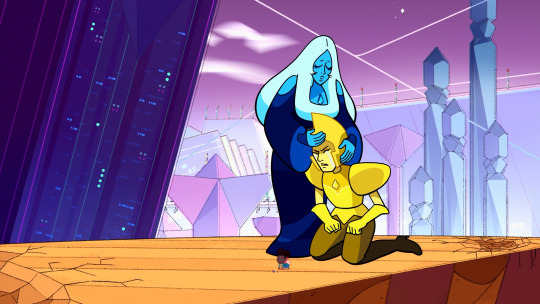
Blue was emotionally ready to accept that Pink was suffering, but hadn’t considered the Diamonds’ role in that suffering. Yellow knew that Pink suffered thanks to the Diamonds, but suppressed her emotions to the point where she couldn’t empathize with her sister’s plight. Blue needed to be more thoughtful to change, and Yellow needed to be more in touch with her emotions to change, and thus the stage is set for the Battle of Heart and Mind against White Diamond.
Except that this isn’t the lesson of Change Your Mind. Blue and Yellow show that some bigots can be reached, which is great! But despite their differences, Steven uses the same basic strategy in both: he doesn’t let them belittle his identity, he confidently dispels their wrongheaded assumptions, and he gets help from allies instead of shouldering the burden himself. We spend the beginning of the episode seeing that in the right circumstances this approach can work, but from here we’ll see that with some bigots, it’s a non-starter.
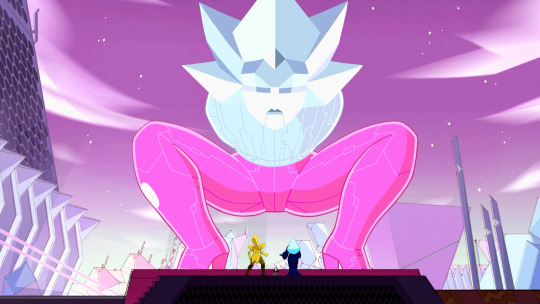
So long as you can engage with bigots while maintaining your self-respect, it can be good work to try and help them see the light. It’s not an obligation, but if you want to change hearts and minds, Steven provides a good template for how to do it. Now the rest of the episode can focus on the bigger lesson: if someone refuses to respect your humanity when you’re steadfast and forthright, it isn’t your job to breathe in their poison, or to hold your breath until you asphyxiate waiting for change.
But more on that after the break!
I Can’t Believe We’ve Come So Far
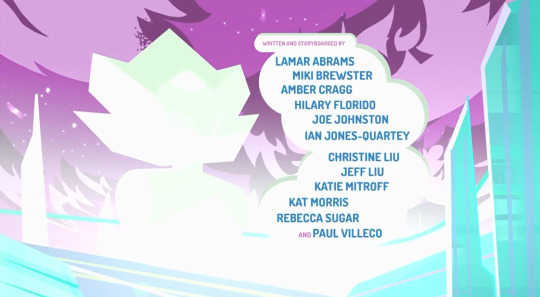
As we reach the end of the original series, it would be criminal not to acknowledge three long-time storyboarders who are on their way out. This isn’t their final contribution to the series, as only one of Change Your Mind’s twelve credited writer/boarders didn’t go on to work on The Movie in some way (Christine Liu, whose tenure was brief but great), and Hilary Florido stayed on as a supervisor for Future. But I wanted to write the big sendoffs here, as this is the last proper “episode” that these three worked on as regular boarders. So it’s time to say goodbye to Katie Mitroff, Hilary Florido, and Jeff Liu.
First up is Katie Mitroff, who clocked two early knockouts with Alone Together and The Test alongside Florido. Mitroff’n’Florido went on to make other classics like Maximum Capacity and Joy Ride before the former teamed up with Lamar Abrams and the latter teamed up with Jesse Zuke for their next batch of episodes.
With Abrams, Mitroff deepened the lore of the show with We Need to Talk, Steven’s Birthday, Bismuth, Buddy’s Book, Three Gems and a Baby, and especially The Answer. She gave us the harrowing revelation of Back to the Moon, and the most ridiculous episode of the series, Restaurant Wars. Her final partner was Paul Villeco, finishing strong with The Trial, Back to the Kindergarten, Your Mother and Mine, Pool Hopping, What’s Your Problem?, Reunited, and Change Your Mind, 100% of which are either in my Love ‘em ranking or my Top Episodes. (Oh, sorry, spoiler alert I love Change Your Mind.)
It’s strange, because she didn’t work on any of the major episodes of Amethyst’s big arc at the end of Season 3, but Mitroff is one of my favorite Amethyst boarders: she’s the consistent thread between Maximum Capacity, Back to the Moon, and What’s Your Problem?, three cornerstones of the character. She excelled at going outside the show’s usual style, as seen in The Answer and Your Mother and Mine, and it’s no coincidence she helped animate Isn’t It Love? to bring Cotton Candy Garnet back for one last ride.
Katie Mitroff is an absolute rock star, I wish her well and you should too.
190 notes
·
View notes
Text
No James wasn’t the devil and snape wasn’t his innocent victim.
No, James wasn’t the reincarnation of the devil. James was a spoiled rich kid who tortured people because he was bored. It’s in the books: Severus wasn’t his only victim, and James enjoyed hexing people in the corridors simply because they annoyed him at the moment. That’s the definition of a bully, because there’s no mention that the people he tormented were future Death Eaters, so they could very well have been just random kids who happened to be there, and he felt entitled to bother them because he was a rich kid from a pure-blood family who had been raised in luxury and probably thought the world belonged to him. Does that make him the devil? No. Does it make him a massive jerk? Absolutely.
Lately I’ve seen Snape Stans insisting that snape only became a death eater because of James or Sirius or his father or anyone else they want to blame,
Severus became a Death Eater — literally stated by Rowling — because he was looking for a place to belong, where he could feel important and gain power. Considering he was a half-blood raised among Muggles in a terribly poor environment, it’s not hard to understand why he had that need to feel important. If we also consider the years of violence he endured, we don’t need a degree in psychology to see where his attraction to power came from. It’s basic analysis; it’s understanding the context.
In the flashback scenes which take place before hogwarts, snape intentionally attacks a muggle with magic and makes it clear to lily that he sees her as an exception to blood purity and other muggleborns because she’s different.
Are you talking about Petunia, who insulted him as soon as she met him, mocked him for wearing girls’ clothes, and called him a freak and weirdo whenever she could? Because if you want, we can get into the classism dripping from that child’s comments. In any case, it’s well established that the incident with Petunia was an accident.
Snape also already knew more dark magic than most adults as an incoming first year, which is listed as one of the reasons that snape was so hated by James
James and Sirius start mocking Severus during their first encounter on the train, without knowing whether he liked the Dark Arts or not. Saying they hated him because of his taste for the Dark Arts when they had already chosen him as a target before even knowing his name seems like deliberately ignoring canon to suit an argument that’s already shaky at best.
I cannot find it reasonable to hate James for hating snape when snape was using dark magic and slurs on other students and clearly well on the way to being a death eater even in the early years.
As I’ve said, James targeted Severus from the start; he was the one who initiated the attacks from day one. Ignoring this and saying that James only hit him, chased him, and publicly humiliated him as some sort of vigilante defending the oppressed is utterly ridiculous. First, because he was a kid with economic and social superiority and strong family support picking on someone with no resources. Second, because he always had his friends with him while Severus was alone. And third, because the fact that James went around tormenting other students shows that the problem wasn’t Severus being who he was, but that James was a damn bully. Plus, you emphasize the Dark Magic aspect, but I don’t see you mentioning James and Sirius attacking another student with an illegal spell. A student who, by all indications, wasn’t a dark wizard or a Slytherin. Again, your argument falls apart.
James learnt he took things too far as he grew up and began to avoid snape not wanting to provoke a fight, and snape would seek him out to attack him causing James to defend himself (ootp).
Literally, Sirius and Remus tell Harry when he asks if James continued messing with Severus that Severus was a “special case,” making it clear that no, James didn’t stop messing with him; Severus was his “special case.” What the hell are you talking about?
the idea that snape was abused by his muggle father, and therefore it’s somehow okay that he became a death eater, is essentially a headcanon and a weird one. The only mention of his parents in the books is that they argue with each other and that his father is a generally miserable person- but not abusive. The idea of snape being whipped by his father came from a website, not the books or the movies or even written by jkr herself -
False, Rowling established on Pottermore that Severus’s father did, in fact, hit him. I can understand if you don’t accept anything that’s not in the books, but you just denied that this information exists, and that’s a lie. That information is there; Rowling said it, so we can consider it canon and say that, indeed, Severus came from a violent childhood. And even if his father hadn’t hit him, it’s established that he came from a very poor and dysfunctional family to the point of feeling lonely, isolated, and unable to afford proper clothes.
Snape was not forced to be a death eater simply by proximity, he could have chosen to remain close to lily or other people who were not involved in the war- but he did not. He chose to be a death eater for the power and freedom to use dark magic, and because he was a blood purist as a younger man even if he grew out of it later in life.
Did he have the option to stay close to Lily? How? By dating her and hanging out with her friends, who were also buddies with the guys bullying him 24/7? By somehow getting accepted among people in a house where the kings were precisely his main tormentors? And then what? Endure them mistreating, humiliating, and marginalizing him in Slytherin for dating those people? Spend seven years of his life surrounded by people who hated him and would have made his life even more unbearable than the Marauders did? And if not that, what else? Leave school to do what? Return to his miserable neighborhood to live in absolute poverty?
Overall, it’s just not true to claim that the actions of James or anyone else are the reason snape “turned out” the way he did. The rivalry with James did not make snape turn out how he did because he was already like that before he even met James.
No, Severus wasn’t a dark and sinister being before meeting James. Snape was a child in a vulnerable situation and at risk of social exclusion, and this is easy to understand if you know the context of the time and what it meant to live in a poor neighborhood in an industrial city. Kids like him already have very few opportunities for success and for improving their social standing. Magic was one of those paths, but instead of finding a better place at Hogwarts, he encountered two arrogant jerks who started bothering him on his first train ride. Two arrogant jerks who were rich, who had economic and social power, who came from important families. Two kids who mistreated him, humiliated him publicly, and one of them even attempted to murder him. Two kids who were never sanctioned or expelled for their actions.
He found a house where, if he adapted, they offered him a way to rise out of his miserable situation and achieve his aspirations and gain the power he had never had, but where he was also cannon fodder if he didn’t adapt due to his half-blood status. He found a group of people who seemed to accept him and who made him feel useful, and like so many other kids in his same socioeconomic situation, he fell into that trap.
Honestly, ignoring Severus’s entire context and reducing him to an evil and resentful child is massively classist. But considering how you dismiss canon entirely to defend rich, almost aristocratic brats who enjoyed tormenting working-class kids, it doesn’t surprise me that you have that kind of terrible mentality.
No James wasn’t the devil and snape wasn’t his innocent victim.
Lately I’ve seen Snape Stans insisting that snape only became a death eater because of James or Sirius or his father or anyone else they want to blame, and that snape was innocent before hogwarts and innocent in all of his choices. It’s clear in the books that this is not the case. In the flashback scenes which take place before hogwarts, snape intentionally attacks a muggle with magic and makes it clear to lily that he sees her as an exception to blood purity and other muggleborns because she’s different. When lily asks him if her blood status matters he hesitates before saying it doesn’t matter, this is because it does matter to him but he thinks that she is special enough anyway. Not to mention that snape began using slurs against muggleborns before saying it to lily in fifth year, which she reveals she knew about when he tried to apologise for it.
Snape also already knew more dark magic than most adults as an incoming first year, which is listed as one of the reasons that snape was so hated by James, as Sirius and Remus say that James was always against dark magic and blood purity. Snape was using dark magic as a student early on, lily mentions he and his friends using dark magic - even against another student which snape says was just a “joke”.
I cannot find it reasonable to hate James for hating snape when snape was using dark magic and slurs on other students and clearly well on the way to being a death eater even in the early years. James learnt he took things too far as he grew up and began to avoid snape not wanting to provoke a fight, and snape would seek him out to attack him causing James to defend himself (ootp). This is not the actions of an innocent boy and his devilish bully this is a rivalry with the tensions of the war looming over them.
Also, the idea that snape was abused by his muggle father, and therefore it’s somehow okay that he became a death eater, is essentially a headcanon and a weird one. The only mention of his parents in the books is that they argue with each other and that his father is a generally miserable person- but not abusive. The idea of snape being whipped by his father came from a website, not the books or the movies or even written by jkr herself - it is therefore not canon. It is also so weird for people to try and justify snape becoming the equivalent of a Nazi because his father abused him and he happened to be a muggle, when snape grew up in a muggle neighbourhood and would have had many other experiences with muggles that were not abusive. It’s just nonsense.
Furthermore, trying to justify snape being a death eater by saying he had no other choice because he was a slytherin is again nonsense. Not every slytherin became a death eater and most people were not involved in the war based on the size of the order of the phoenix and the original named death eaters. Snape was not forced to be a death eater simply by proximity, he could have chosen to remain close to lily or other people who were not involved in the war- but he did not. He chose to be a death eater for the power and freedom to use dark magic, and because he was a blood purist as a younger man even if he grew out of it later in life.
Overall, it’s just not true to claim that the actions of James or anyone else are the reason snape “turned out” the way he did. The rivalry with James did not make snape turn out how he did because he was already like that before he even met James.
Snape is a very grey character, in my opinion more dark than light, and trying to justify his terrible behaviour by blaming everyone else takes away from the depth of his character and is also just not accurate to the canon.
#severus snape#severus snape defense#severus snape analysis#pro severus snape#severus snape fandom#snapedom
157 notes
·
View notes
Text
09 - Negotiations
Summary: Unity day has arrived, and Y/n gets a little too drunk, revealing a truth she didn’t know she had. Once morning arrives, she meets with Anya at the bridge in hopes to not repeat history, but things go south quicky when Jasper fires the first shot.
Word Count: 3.20k
Based Off: 01x09 “Unity Day”
A/N: The next few chapters, along with this one, are my favourites just because it gets more into Y/n and Bellamy’s relationship

You and the others gathered around the screen that Raven had set up for camp to watch Jaha recite his Unity Day speech. You weren’t exactly listening, but you were brought back to Earth when Jasper came out of his and Monty’s tent with a large container.
“Whoo! Yeah! Monty strikes again!” He removed the goggles from his eyes, running out into the middle of camp. “Call this batch Unity Juice!”
You laughed at your brother’s antics but went over to him to have a drink with everyone else. He started to fill everyone’s cups and as you waited, you noticed Octavia slipping out of camp.
You decided you would ask about it later, but for now you wanted to have some fun. You realised that you were on the edge of the group and may not be able to get any drinks at the moment, so you went back to Jaha’s speech.
“The first Exodus ship launches in 60 hours, carrying the reinforcements that you need, so stay strong.” He informed you. You noticed your father's face on the far right side of the screen, but didn’t make a sound about it. He was likely going to be on the first ship with Clarke’s mother and almost all of the other important people, so you would have to face him at some point.
You began watching the pageant, which always had been the best part about Unity Day for you, until the radio signal cut out. “What was that?”
“Probably just interference, I’ll see if I can get it back up and running.” Raven responded, moving to the radio. You nodded and shook off your nerves. Worse things have happened.

The Unity Day party had progressed very far into the night as teenagers drank and drank. You only had two drinks so far, but excused yourself from conversation with Monroe to approach Bellamy, who was watching the party instead of joining in the fun. You saw Clarke approach him too, but continued with your walk.
“Hey, the comms are still dead.” She told the two of you.
“Best Unity Day ever.” Bellamy commented.
“I’m pretty sure there’s one that beats this,” You defended.
“Oh really? Tell me, princess, which one beats this?” Bellamy asked, motioning out to the raging party in front of you.
“Unity Day. 12 years ago. I was the storyteller, 9 years old. Got up there and puked my guts out three minutes into the pageant.”
“Okay, that definitely beats this. I have to see the tapes when they come down.” Bellamy laughed.
“Wait, that was you?” Clarke asked, and you nodded. “Oh my God, I remember that! Four other kids threw up because they couldn’t stand the sight of it, me included.”
Bellamy just laughed harder, and you shook your head. “Do you really knink now is a good time to be having a party, though?” Clarke turned serious. “I mean, the grounder is out there.”
“Grounders.” Bellamy emphasized. “By now, he’s made it home. He’s probably putting together a lynch mob.”
When he saw Clarkes stress, he spoke again. “Relax. I got security covered. Why don’t you go get a drink?”
“Why don’t you?” You asked him. “Clarke isn’t the only one who could use a drink, Bellamy.”
“I could use more than one,” Clarke commented.
“Then have more than one.” When she shook her head, Bellamy told her, “Clarke, the Exodus ship carrying your mother is coming down in two days. After that, the party’s over. Have some fun while you still can. You deserve it.”
Clarke agreed and walked away to get herself a drink.
“What about you?” You asked.
“What about me?”
“You can’t tell Clarke to relax and have a drink if you’re not going to. That makes you a hypocrite, you know.” You smirked. Bellamy rolled his eyes playfully and you laughed.
“Well if you’re not going to drink, then I guess I’ll just drink for the both of us then.” You smirked at Bellamy and walked away while still facing him before turning around to grab your second drink and continue talking to Monroe.

You had about four drinks so far, and because you’d never had any type of alcohol before, you were still a bit of a lightweight. Of course, you were sober enough to know what was going on, but you were less tight-lipped and more… loose with what you were saying and doing.
You had been roped into a game of truth or dare with Monroe, Harper, Jasper, and Monty a little while ago, and playing drunk - even if you were only tipsy - was better than playing sober.
You sat around the fire and Monroe had asked you if you wanted truth or dare. Everyone was less incapacitated than you were, because you held your word with Bellamy; you were going to drink for two people. “Truth,” You slurred.
Monroe laughed and asked you, “If you had to, would you have sex with Bellamy?”
You thought over her words for a minute, before looking up from the fire and answering casually.
“Hell yeah I’d jump his bones,” Your answer had everyone practically in stitches, but as you thought over your answer you added, “If I absolutely had to.”
And almost immediately after that, a very sober Bellamy looped your arm over the back of his neck and hoisted you up, putting an arm around your waist in an attempt to steady you. “I’m gonna take her back to her tent before she says or does anything else incredibly stupid.” He told the group, carrying you off to your tent.
Once you were inside and had your jacket off, Bellamy laid you down and covered you up with the makeshift blanket you had, thinking back to what you had just said while you giggled about nothing.
“Would you actually have sex with me?” He asked bashfully.
You stopped your giggling and motioned for Bellamy to come closer.
“Hell yeah, I would. You’re hot.” You said, giggling again and reaching up to boop his nose. Bellamy blushed, although he couldn’t place why. You passed out soon after you told him, and he left the confines of your tent to get some air.

It didn’t take long for you to wake up again, more sober than before. Your face was screwed up, indicating that you were confused. Your brain was lagging and your movements and reflexes were slower than normal, which was understandable. You remembered everything up until sitting around the fire with Monroe, Harper, Jasper, and Monty. Then it got hazy.
“How long have I been out?” You asked Clarke as you made your way towards her.
“Surprisingly, not that long. Bellamy carried you into your tent about an hour ago.” She said. “Speaking of, when he left the tent he looked about as red as the apple he was eating earlier; care to explain?”
“I would love to, but I can’t remember much after I was at the fire.” You groaned. There was a dull throbbing at the back of your head, one that you could deal with, but was ultimately annoying as hell.
You stayed with Clarke to keep yourself out of trouble, as she only sipped very slowly on her drink in case anything were to happen. She was playing some drinking game while you stood by and watched her with amusement. It was when Finn came by and interrupted her that you stepped up.
“What is it?” She asked.
“Let’s take a walk. The three of us.” He motioned to you as well, and you left the party.
“Did something happen?” Clarke asked.
“I need you both to come with me, but I can’t tell you why, okay?” He asked.
“Finn, tell us why.” Clarke demanded.
He looked back at the party and dragged you further away from it, speaking in a low tone. “I set up a meeting with the grounders.”
“A meeting? I don’t understand. With who? And how?” Clarke asked.
“I was just with the grounder that we had in the dropship. His name is Lincoln.” Finn told you both.
“Wait a second,” You interjected. “He spoke to you?”
“It’s not important.” He told you. “If we want to live in peace-”
“Finn, we can’t live in peace with people who have done nothing but kill us.” Clarke said.
“Can you think of a better way to stop the bloodshed?” He asked her.
“Yeah. With the guns that the guard brings down.” Clarke responded.
“You really want a war?” Finn asked angrily. “Because at this rate, that’s what's coming.”
“Actually, I’m on Finn’s side, here.” You told her. “I mean, if we threaten them with guns and violence they’ll only retaliate worse. If I’ve learned anything from reading history book after history book in solitary, it was the same way thousands of years ago.”
“The British came to what was called Canada in the 1800’s and there were Native Americans already living there, so the British forced them to conform to their ways and slaughtered them and oppressed them for years. They buried the Native Americans culture for decades and they were forced to deal with it. I don’t want to be a part of repeating history and causing unnecessary violence, Clarke.” You taught her.
“Look,” Finn resumed. “I know it’s a long shot, but this is our world now, and I think we can do better than the first time around.”
Clarke looked doubtful, so Finn told her that he trusted Lincoln.
“I don’t.” Clarke rebutted. “But if we go, we have to bring backup.”
“No way,” Finn disagreed. “We’re not bringing guns. Those weren’t the terms, and if we’re gonna do this, we’ve got to give it a fair shot.” Clarke sighed, but agreed. You went to get your pack and jacket while Clarke went to get hers, instructing you to meet at the gate. You took off the daggers on your thighs and removed the sword from your hip before meeting the pair at the gate and heading off.
“I would love it if you were right about this, but did you ever consider it might be a trap?” Clarke asked.
“Yeah, but since it’s Unity Day, I decided to have hope instead.” Finn responded cheekily.
“I hope your hope doesn’t get me killed, Finn. I tried it once, it didn't work well with me.” You shook your head at the memory of literally almost dying at the hands of a grounder.
“Seriously, Finn. You’re putting a lot of faith in a guy who stuck a knife in Y/n.” Clarke nodded to you.
“Eh, it’s fine. Really; I’d rather die trying to get peace than kill others without.” You shrugged.
“And you’re sounding more and more like Bellamy.” Finn commented.
“I’m just trying to keep us alive.” Clarke affirmed.
The sun had risen by the time you got to the meeting place, which was an old bridge where Octavia waited. As she noticed you, you went up and hugged her.
“Did you set this up?” You asked her. She nodded and you let go of each other, Clarke barely giving each other time to fully let go before interrogating her.
“So you’re the one that helped the grounder escape.”
“I trust him, Clarke.” She told her.
“There’s a lot of that going around.” Clarke side-glanced Finn, who pointed out that someone was coming.
Running through the brush was Lincoln, and once Octavia caught sight of the man, she ran up to greet him with a hug. You smiled at the pair. Even though Lincoln had almost killed you, you felt happy that Octavia was happy with someone. She’d basically been alone her whole life and she found someone who believed in her.
Then, there was the sound of hoofbeats on the ground, and people came riding in on horses. You and Clarke gasped at the sight, having never seen them before. You, Finn and Clarke ran forward to Lincoln, Finn exclaiming that there wasn’t supposed to be any weapons.
“I was told there wouldn’t be.”
You and Clarke began to walk forward with Finn, who was stopped by Lincoln. “They go alone.”
You and Clarke nervously walk forward to meet the woman who wasn’t hearing a face covering. You silently decided between some glances that you would do most of the talking, to avoid any unnecessary bloodshed or misunderstandings between yourselves and the grounders.
You met in the middle of the bridge. The grounder looked you both up and down before speaking. “Your name is Y/n?” She asked you. You nodded.
“And you are Clarke?” She asked Clarke, who also nodded. “I’m Anya.” She introduced herself.
Clarke stuck out her hand to shake, but Anya just looked at it before Clarke pulled away.
“I think we got off to a rough start,” You began. “But we all want to find a way to live together in peace.”
“I understand,” Anya responded. “You started a war that you don’t know how to end.”
“What? No, we didn’t start anything.” You spoke, trying to explain, but Clarke interjected.
“You attacked us for no reason.” You glared at Clarke, and tried to explain yourself, but Anya spoke up before you could.
“No reason? The missiles you launched burned a village to the ground.”
“The flares?” You realised. “No, that was a signal that was meant for our families. We had no idea-”
“You’re invaders.” Anya interrupted. “Your ship landed in our territory.”
“We realise that we’re invaders.” You spoke up again. “We didn’t know that anyone was here, we believed that the earth wasn’t survivable. We thought the ground was uninhabited.”
“You knew we were here when you sent an armed raiding party to capture one of us and torture him.”
You looked down and sighed at Bellamy’s actions.
“These are all acts of war.”
“I see your point, Anya. I do. I’ve read enough history books to realise that this is a repeat of what happened centuries ago. And that’s why we came here. To put an end to all of this before it starts.” You informed her.
“Lincoln said more of you are coming down, warriors.” Anya questioned.
“Yes, the guard. But also farmers, doctors, engineers.” You persuaded. “We can help each other. But not if we’re at war.”
“Can you promise that these new arrivals won’t attack us? That they’ll respect the terms you and I agree on?” She asked.
“I can’t give a full guarantee right now, we would have to get our radio working again and talk with the council, but we will do everything in our power to get them to honour the terms that we’ve set.” You told her truthfully.
“Why would I agree to an alliance that your people could break the moment they get here?” Anya raised her voice in anger.
“If you fire the first shot, those people coming down won’t bother negotiating.” You told Anya. You were seeing more and more how this was like the history books that you collected. You didn’t want to be like the British, and that’s why you were here in the first place.
“Our technology,” You spoke again. “They will wipe you out without hesitation, and I’m trying to prevent that.”
“They wouldn’t be the first to try.” Anya spoke.
“Y/n, Clarke! Run!” Jasper called out from beside the river, startling you. He began firing shots at the trees across the river, grabbing your attention as Anya pulled a dagger from her sleeve, but Bellamy shot her in the arm before she could move another inch.
She ran back to her horses and you locked eyes with Bellamy as Finn called for you both to get down and avoid any arrows or bullets. As you leapt to the ground, an arrow very narrowly missed your arm, creating a small cut on your shoulder. “Finn, get back!” Clarke called out.
He didn’t listen and instead grabbed the both of you and hauled you up, dragging you away from the bridge as grounders still fired arrows at you, one landing in Lincoln’s chest. He broke it off and instructed the four of you to run back to camp and not to stop until you get there.
You ran behind Clarke with Raven, Jasper, and Octavia ahead of the two of you, and Bellamy and Finn just behind.
Nightfall came once you reached camp, finally slowing down. You breathed heavily along with the others who tried to catch their breath.
“What the hell was that?!” You shouted angrily at the group.
Bellamy and Finn glared at one another until Bellamy spoke up, ignoring your question. “You got something to say?”
“Yeah. I said no guns!” He yelled.
“I told you we couldn’t trust the grounders! And I was right.” Clarke shouted at Finn.
“Why didn’t you tell me what you were up to?” Raven asked her boyfriend.
“I tried, but you were too busy making bullets for your gun!” He defended.
“You’re lucky she brought that!” Bellamy interrupted. “They came there to kill you, Finn.”
“You don’t know that!” You shouted for the first time since your arrival. “Jasper fired the first shot!”
“You ruined everything.” Octavia blamed him. His face turned into a look of hurt as she gave him a disgusted look. Before turning around and heading into camp.
“I saved you!” He yelled after her. “You’re welcome.” He scoffed, heading inside after her.
“Well if we weren’t at war already, we sure as hell are now.” You glared at Bellamy, who ignored your gaze.
“You didn’t have to trust the grounders, Clarke.” Finn told her. “You just had to trust me.”
You conveyed a look of hurt and betrayal to Bellamy as you followed Finn and Raven to head to your tent to sleep, although there was a guarantee you wouldn't get much. Your shoulder began to burn a little where your surface wound was, as the adrenaline of running and yelling kept it away.
Before you even walked past the middle of the camp, a loud explosion caught your attention, as well as the rest of camp’s.
You looked up to see something entering the atmosphere, which you assumed was the Exodus ship.
“Huh. I guess they’re early.” Octavia commented from beside you. You hadn’t even noticed she was there.
You watched as it came closer to the ground, but became increasingly worried. “Hold on. They’re going too fast. And no parachute? Something’s wrong.”
You watched it hurtle towards the ground and crash in between two mountains, a large mushroom cloud floating upwards into the air. Your heart stopped beating in your chest as you grabbed Octavia’s forearm in shock.
Your grandmother. Your father. They were both supposed to be on the ship. “No,” You whispered. Tears brimmed your eyes, making your vision cloudy as you shook your head.
“No. No, no, no!” You sobbed, nearly collapsing as Octavia pulled you into her arms for support.
She pulled you into your tent and sat down on the bed with you, letting you rest your head in her lap while she stroked your hair and covered you with the blanket. You cried into her lap until you fell asleep, but Octavia never left your side that night.
Taglist: @soullessbabee | @hyperion-moonbabe-art3mis | @dummythiccwitch | @sireddobrev | @gxvrielle
#bellamy blake#bellamy blake imagine#bellamy blake series#bellamy x reader#bellamy x you#bellamy x y/n#this is war series
60 notes
·
View notes